Unlocking Ideas: 100+ Prompts Tailored for the 7th-Grade Mind
By: Author Valerie Forgeard
Posted on August 17, 2023
Categories Writing
You’re about to dive into the world of writing prompts for 7th graders. You’ll discover their importance, explore various types, and learn how to choose the right one. This article aims to help you encourage creativity and boost critical thinking skills in your classroom or at home.

Key Takeaways
- Writing prompts ignite creativity and improve writing skills.
- Prompt categorization helps identify strengths and weaknesses.
- Challenging prompts can be rewarding.
- Understanding student interests is crucial for engaging 7th graders.
100 Writing Prompts for 7th Graders
Personal writing is like opening a window into your soul, allowing fresh insights to pour in and old doubts to flutter out. Every prompt is an invitation, a beckoning to delve deeper into your own psyche, experiences, and aspirations.
From your bravest moments to your most profound failures, these questions aim to guide you through a labyrinth of emotions, dreams, and memories.
Whether you’re a seasoned journal enthusiast or someone looking to start, this collection ensures that every day becomes an opportunity for introspection. Embrace the quest of understanding oneself, and let these prompts light your path.
- Write about a time you ventured out of your comfort zone.
- Reflect on your proudest achievement to date.
- If you could switch lives with someone, who would it be?
- Describe your ultimate leisure activity in detail.
- Recall a time fear gripped you.
- Sketch out your dream holiday scenario.
- Share a pivotal life lesson and its source.
- Narrate a day from your pet’s perspective.
- Envision an invention to better our world.
- List traits of a true friend.
- Reflect on a moment you swelled with pride.
- If you could reside anywhere, where would that be?
- Set a goal for this academic year.
- Talk about a moment of sheer disappointment.
- Dream up your superhero persona.
- Which possession holds great sentimental value?
- Plan your ideal weekend.
- Remember an instance when inspiration struck.
- Jot down things that tickle your funny bone.
- Offer a piece of advice for newcomers to your school.
- Paint a picture of your serene natural spot.
- Revisit a moment of profound gratitude.
- Describe your envisioned career path.
- Reflect on a holiday that warms your heart.
- Recall an experience with a hard-hitting lesson.
- Compliment yourself on a unique quality.
- Describe an unforgettable gesture of kindness towards you.
- Share feelings from a lonesome period.
- Define the markers of a commendable teacher.
- Take a trip down a cherished childhood memory lane.
- Introduce yourself to your role model.
- If you had a global platform for a day, what’s your message?
- Confront your greatest phobia.
- Chronicle a burst of creativity.
- Savor the memory of your most delectable meal.
- Celebrate what sets you apart from the crowd.
- Open up about facing and overcoming adversity.
- Rekindle one of life’s joyful milestones.
- If time travel were possible, where and when would you go?
- Describe your birthday bash of dreams.
- Recommend an unforgettable book.
- Unravel feelings from an anxious episode.
- Choose your dinner companion from any point in history.
- Revel in your favorite season’s charms.
- Salute your bravest act.
- Share three happiness sources.
- Reflect on a treasured family custom.
- If the zoo gates opened, which animal becomes your pet?
- Define the essence of friendship.
- If there’s one item in infinite supply, what’s your pick?
- Describe your ultimate weekend blueprint.
- Embark on your most thrilling adventure again.
- Spell out your most anticipated month.
- Recall a moment that tested your mettle.
- Who would attend your ideal birthday celebration?
- What qualities form a steadfast friend?
- Introduce your safe haven or retreat.
- If you were to compete in the Olympics, your sport is?
- Ponder upon a transformative experience.
- Which tune resonates with your soul?
- If any subject was available, what’s your elective?
- Share your strategy against looming fears.
- Detail your fantasy expedition.
- Reiterate a life-changing piece of advice.
- Unearth memories of a creative spree.
- Spotlight a goal for the upcoming year.
- Who stands as the beacon of heroism in your life?
- Set three targets for your current educational phase.
- Envision an unrestricted course for the next term.
- What activity makes weekends special for you?
- Recall a testing moment and its aftermath.
- Who’s the beacon of heroism in your world?
- Draft an action plan for an imminent objective.
- Explore an instance when motivation fueled you.
- If you could decode any subject next term, what would it be?
- Revisit an encounter that changed your perspective.
- If you could amplify a single trait, which would it be?
- What does an average day in your life look like?
- Share a moment when you stood up for something.
- Pen down your thoughts about personal growth.
- Recall an incident that evoked strong emotions.
- Describe a challenge and its valuable lessons.
- List hobbies that relax and rejuvenate you.
- Reflect on a time you surpassed your own expectations.
- Describe an act that left a lasting impact on you.
- Which creature comforts bring you the most joy?
- Share insights from an eye-opening book.
- Describe a random act of kindness you’ve recently witnessed.
- Chronicle a moment of sheer determination.
- If you were a novel character, who would you be?
- Reflect on an experience with a profound impact.
- Which fantasy realm would you reside in?
- Recall a time when a movie deeply moved you.
- If you authored a book, what’s its core message?
- Share your feelings on an unresolved personal challenge.
- Remember a moment that tested your patience.
- Explore feelings from a challenging transitional phase.
- Share an unexpected source of inspiration.
- Describe a ritual that centers and grounds you.
- Reflect on a time you stepped up as a leader.
Understanding the Importance of Writing Prompts

It’s vital for 7th graders to understand that writing prompts aren’t just school tasks, they’re tools to ignite their creativity and improve their writing skills. Prompt categorization helps you identify your strengths and weaknesses in different areas of writing. For instance, are you better at descriptive or narrative pieces? Use these prompts as a pathway to discover your unique voice.
Prompt diversity is also crucial. By responding to various types of prompts – from persuasive essays about current events to creative stories about imaginary worlds – you’ll become a more versatile writer. Don’t shy away from challenging ones; they can sometimes be the most rewarding!
Exploring Different Types of Writing Prompts

Let’s delve into the various kinds of assignments they’ll encounter. The key to prompt variety is understanding its role in student engagement.
You see, diverse prompts can cater to different learning styles and interests, making writing tasks more appealing.
Consider narrative prompts that encourage students to fabricate a story or share personal experiences. These stimulate creativity and self-expression.
Descriptive prompts, on the other hand, refine sensory observation skills as students paint vivid images with words.
Compare-contrast prompts foster critical thinking by analyzing similarities and differences between subjects.
Lastly, persuasive prompts develop argumentation skills as students defend their standpoints.
Tips to Choose the Right Writing Prompt

You’re about to dive into the art of choosing the right writing prompt, and it’s crucial you understand three key factors: student interests, difficulty level, and learning outcome.
It’s not enough to pick a prompt at random; you’ve got to hone in on what your students are passionate about to truly engage them.
Balancing their interests with an appropriate challenge and clear learning goals will make all the difference in their educational journey.
Understanding Student Interests
Understanding your students’ interests can significantly enhance your ability to create engaging writing prompts. It’s essential to consider student hobbies and extracurricular activities while crafting these prompts. This step not only fosters a connection between you and your pupils, but it also makes the learning process more enjoyable for them.
Here are some ways to explore their interests:
- Conduct surveys or questionnaires
- Keep an eye out for what they get excited about in class
- Engage with parents or caregivers about student hobbies outside school
- Observe their participation in extracurricular activities
Difficulty Level Consideration
It’s equally important to take into account the difficulty level of the tasks you’re assigning. You must strike a balance with prompt complexity to encourage student adaptability, not frustration. Too simple, and they’re bored; too hard, and they may give up.
Consider their academic abilities: Are they struggling or excelling? This requires adjusting your expectations and prompts accordingly. Engage them with challenges that stretch their capabilities but remain within reach.
Also, diversify task types — mix easier tasks with complex ones. This approach fosters resilience as students navigate different levels of challenge while boosting their confidence when they complete trickier assignments successfully.
Prompt’s Learning Outcome
Right on the heels of considering the difficulty level, you’re now ready to tackle ‘Prompt’s Learning Outcome.’
Understanding the outcome is paramount in prompt evaluation and curriculum integration. So, how can you ensure that your writing prompts are pedagogically effective?
- Start by aligning them with specific learning objectives.
- Next, consider how they fit into wider units or themes in your curriculum.
- Evaluate whether they encourage critical thinking and creativity.
- Lastly, think about their potential for engaging students and sparking interest.
Encouraging Creativity in 7th Graders

You’re about to explore three essential elements that can ignite the spark of creativity in your 7th graders: boosting creative thinking, innovative writing exercises, and nurturing artistic expression.
Each component is designed not only to enhance their academic skills but also to unleash their imaginative power.
Boosting Creative Thinking
Boosting creative thinking is often achieved through engaging in various forms of art, such as painting and music. But let’s not forget about writing too! You can overcome creativity barriers by using unconventional prompts.
Here are a few tips to help you:
- Break the norm: Use prompts that challenge traditional thinking. This could be an unusual scenario or a different perspective.
- Embrace randomness: Let unpredictability fuel your imagination. A random word or image can spark unique ideas.
- Think visually: Drawings or photos can serve as great prompts too, stimulating your visual intelligence.
- Be open to failures: Don’t fear making mistakes; they’re part of the creative process.
Innovative Writing Exercises
Let’s dive into some innovative exercises that’ll surely ignite your creative writing skills. Experiment with prompt variations and storytelling techniques to stretch your imagination.
For instance, try altering a well-known fairy tale by changing its setting or ending. This engages your creativity and helps you explore different narrative possibilities.
Another exercise is to use an object in your room as the central element of a story. Describe it vividly, give it a backstory, make it the hero or villain – there’re no limits!
Also consider retelling an event from multiple perspectives. It can be any historical event or even something mundane like making breakfast.
These exercises aren’t just fun but also great training in perspective-switching, character development, and plot creation. Give it a shot!
Nurturing Artistic Expression
Nurturing artistic expression isn’t only about mastering technical skills. It’s also about exploring one’s emotions and experiences in a creative way. As you facilitate your 7th grader’s artistic development, consider employing different expression techniques that will help them convey their thoughts and feelings effectively.
Here are some strategies to guide you:
- Encourage open-ended creativity: Don’t limit them to traditional forms of art.
- Provide an environment that fosters imagination: Surround them with inspiring materials and resources.
- Teach them how to use various tools: Brushes, pens, clay – the choices are endless.
- Promote emotional intelligence: Help them understand their feelings and translate those into art.
Writing Prompts to Boost Critical Thinking Skills

Encouraging critical thinking skills in 7th graders can be achieved through well-crafted writing prompts. Promoting empathy and digital literacy is a great way to do this.
Begin by presenting situations that require students to step into someone else’s shoes. Ask them how they’d feel, react, or handle those circumstances. This will not only stimulate their imagination but also foster understanding and compassion.
Incorporating digital literacy is equally important. You can assign tasks where they’ll need to evaluate the credibility of online sources or identify fake news. As they navigate these challenges, they’re honing their ability to discern truth from falsehood—an essential skill for the 21st century.
Narrative Writing Prompts for 7th Graders

You’re about to embark on a journey through narrative writing prompts specifically designed for 7th graders.
We’ll delve into the exploration of personal experiences, create imaginative scenarios, and reflect deeply through journal entries.
Get ready, as this adventure will not only hone your writing skills but also give you a chance to introspect and voice your thoughts in an engaging way.
Exploring Personal Experiences
Think about a time when you’ve faced a tough decision and what you learned from that experience. Exploring personal experiences can be an insightful journey into your own personal growth documentation, often revealing unseen perspectives.
When writing about personal experiences, consider these elements:
- Describe the situation in detail
- Identify the choices you had available
- Explain why it was a challenging choice
- Share what you learned from this experience
Writing about your own life isn’t just engaging for others to read, it’s also enlightening for yourself. It allows exploration of unseen perspectives and provides invaluable documentation of your personal growth.
Imaginative Scenario Prompts
Let’s dive into imaginative scenario prompts. They’re a fantastic way to spark creativity and broaden your horizons.
Picture this: you’re exploring alien encounters on a distant planet. How do you communicate? What does their society look like? These prompts push you to think outside the box and concoct wildly inventive narratives.
Now, let’s take a deep breath and plunge into underwater adventures. You’re swimming among vibrant coral reefs, encountering mysterious sea creatures. How do you navigate this new environment? What undiscovered species might lurk in the depths?
These scenarios aren’t just fun; they enhance critical thinking and writing skills. So next time you need inspiration, remember these unique scenarios. They’ll certainly stretch your imagination!
Reflective Journal Entries
Reflective journal entries can be quite enlightening. They’re an excellent tool for processing your thoughts and emotions. As a 7th grader, these can help you understand your emotional intelligence and navigate peer interactions better.
Consider the following prompts for your reflective journal entries:
- Reflect on a recent situation where you effectively managed your emotions.
- Narrate an incident involving a peer interaction that led to personal growth.
- Discuss how understanding others’ emotions has improved your relationships.
- Ponder over the role of empathy in enhancing emotional intelligence.
Writing about these will not only refine your writing skills but also boost self-awareness. So, grab a pen and start exploring yourself through words! Remember, it’s not just about recording events but recognizing feelings too.
Persuasive Writing Prompts for 7th Graders

You’ll find these persuasive writing prompts for 7th graders engaging and challenging. They are specially designed to have cultural relevance, making them more relatable and interesting for your students. For instance, one prompt could be debating the significance of celebrating diverse cultures in schools.
Moreover, incorporating humor into these prompts can make the learning process more enjoyable. You can ask your students to write a persuasive essay on why their favorite comedian should be considered a national treasure. This task will surely spark their interest and creativity.
Using these tactics not only enhances their critical thinking but also improves their ability to communicate effectively with others. It’s an excellent way to prepare them for real-world situations while keeping things fun and engaging!
Expository Writing Prompts for 7th Graders

Switching gears, expository tasks encourage your 7th grade students to investigate an idea, evaluate evidence, and present a clear point of view on the subject. Here’s where prompt selection strategies come into play. Selecting the right expository writing prompts can trigger their imagination and analytical skills.
Expository writing benefits are plenty:
- It enhances critical thinking.
- Boosts research skills.
- Improves clarity in communication.
- Increases knowledge on various topics.
You’ll find that it’s not just about improving their writing but also enriching their understanding of the world around them. So don’t hesitate to challenge them with diverse topics from technology to social issues. Remember, the goal is to make learning enjoyable and engaging while fostering intellectual growth.
Dealing With Writer’s Block

When tackling writer’s block, it’s important that you don’t let it intimidate you; instead, view it as a challenge to overcome. Consider this block overcoming strategy: seek inspiration from different sources and ignite your creativity. Maybe read a book or watch a movie that excites you. Take a walk in nature or listen to some music. You’d be surprised how these little things can spark your creative ignition.
How to Use Writing Prompts Effectively

Utilizing thought-provoking questions effectively can significantly aid in overcoming writer’s block and reigniting your creativity. To make the most of writing prompts, consider prompt personalization. Tailor each prompt to resonate with your interests or experiences.
Here are some tips on how to use writing prompts effectively:
- Personalize the scenario: Change the characters or setting to something more relatable.
- Use it as a jumping-off point: Let the prompt inspire you, but don’t feel limited by it.
- Add a twist: Modify the prompt to add an unexpected element that sparks your creativity.
- Set a timer: This can increase your writing motivation by creating a sense of urgency.
The Role of Feedback in Writing

It’s critical to understand the role of feedback in the writing process, as it offers a fresh perspective and can help hone one’s skills. Peer evaluation plays a significant part here. It allows you to receive reactions from someone who is on an equal footing with you and understands your position.
Feedback interpretation is another crucial aspect. You shouldn’t take criticism personally, instead see it as an opportunity for growth. Understand that each piece of advice given is meant to improve your writing abilities.
Example Writing Prompts and Responses

You’re going to find examples of prompts and responses incredibly useful for understanding the concept better. When it comes to prompt selection, it’s crucial to choose ones that will spark student motivation and push their thinking boundaries. Remember, you want your students not only to write but also to enjoy the process.
Here are a few example prompts:
- Write about a time when you had to make a tough decision.
- Describe a place that makes you feel happy.
- Imagine what life would be like if we could live on another planet.
- Craft an argument for or against school uniforms.
The aim is not just completion, but engagement. So, always consider students’ interests and aspirations when selecting prompts. This approach ensures they stay motivated throughout their writing journey.
The Benefits of Regular Writing Practice

After exploring various writing prompts and seeing how they can be tackled, let’s now dive into the benefits of regular writing practice.
As a 7th grader, you’re likely encountering more complex language tasks. Regular writing doesn’t just improve your ability to craft engaging stories or persuasive arguments; it also contributes significantly to your language development and vocabulary enhancement.
By consistently practicing, you’ll naturally expand your vocabulary as you strive to express yourself accurately and eloquently. You’re not just jotting down words—you’re learning how they interact, how they convey nuanced meanings, and how best to use them in different contexts.
So keep sharpening that pen (or keyboard!). The benefits are manifold: better academic performance, improved communication skills, even enhanced critical thinking.
Embrace the journey!
So, you’re all set to boost your 7th grader’s writing skills. Remember, the perfect prompt can ignite their creativity and critical thinking. Use them effectively, give constructive feedback, and encourage regular practice.
Dive into this exciting world of words together and watch them grow as confident, articulate writers!
- Writing Tips
- 500+ Free Fiction Writing Prompts For Adults By Genre
- Self Publishing 101
- Best Writing Books
- Dragon Dictation Software Review
- Editing Software
- Email Marketing
- Formatting Software
- Gifts for Writers
- MasterClass Reviews
- Online Courses
- Scrivener 3 Review
- Website Hosting
- YouTube Channels
Select Page
100 Amazing 7th Grade Writing Prompts
Writing Prompts |
Disclosure: The content on this site is free. Some of the links below are affiliate links from companies like Amazon.com and if you click the links and make a purchase we will receive a small commission at no additional cost to you. Thank you in advance if you decide to support our site by using our affiliate links!
100 Amazing 7 th Grade Writing Prompts
Looking for some great writing prompts to help spark your students’ interest in writing? If yes, this post is just what you need. From persuasive writing prompts to compare and contrast, we have much to help 7 th graders refine their core writing skills.
We’ll discuss:
- Compare and contrast writing prompts
- Persuasive writing prompts
- Expository essay writing prompts
- Creative essay writing prompts
- Descriptive essay writing prompts
Compare and contrast writing prompts for 7 th Grade
- How are coffee and Tea different? How are they same?
- Is life as a 7 th grader today different than it was when your parents were studying in the 7 th grade? If yes, in what aspects it is different?
- What’s different between a cheetah and a tiger?
- What family traits you share with your siblings (or if you don’t have siblings, then with your cousins)?
- Pick two of your most favorite characters in books. How are the alike? How are they different?
- What does the phrase “comparing apples to oranges” mean? Is there absolutely nothing in common between these two fruits? If the answer is no, write their common traits?
- What is the best spaghetti you ever had? Which one was the worst? How would you compare the two?
- What are the similarities and differences between Barrack Obama and Abraham Lincoln?
- Pick your two favorite role models? In what ways they are the same and different?
- What are the similarities and the differences between you and your best friend?
- How smartphone is different than a traditional telephone?
- Pick any two movie stars you like. In what ways they are the same and different?
- In what ways a photograph is different than a drawing? How are they alike?
- Think of the last two family vacations your family has taken. Compare and contrast them.
- They say, “Pen is mightier than the sword.” Explain in what ways Pen is mightier.
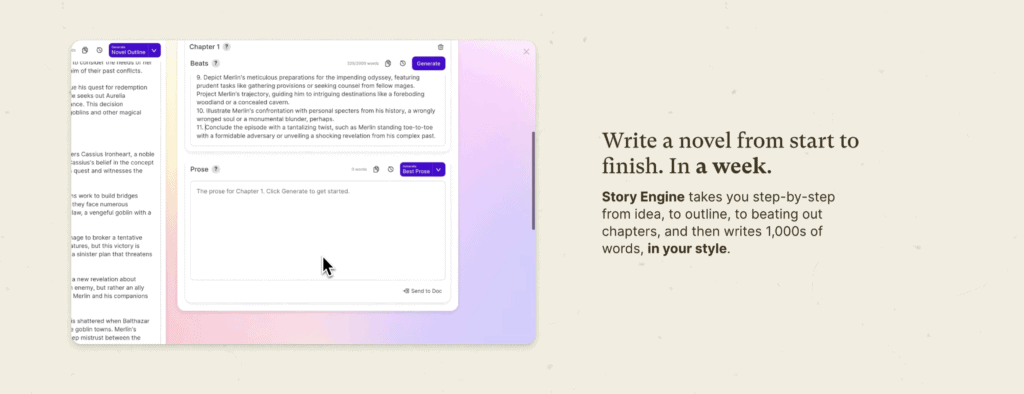
Persuasive writing prompts for 7 th Grade
- Imagine you are running for the school council. What changes would you introduce at your school?
- What would the perfect lunch menu look like?
- Think about a problem the local community is facing. Design a solution for the problem and write a strong letter to the community leader citing reasons why they should give your recommendation a try.
- Think about a problem your school is facing. Come up with a way to solve the problem. Write a letter to the principal stating why your solution is worth a try.
- What is one rule in your family that you think is outdated and should be done away with? Give your reasons.
- What is one school rule that you think is outdated? Convince school leaders to drop it.
- You love pets and want to bring one home. However, your parents are dead against it. Convince them by highlighting the benefits of having a pet at home.
- Make a list of three advertisements that you think affect consumers in a negative way. Explain why these ads should stop running.
- Studies suggest teens need more hours of sleep than adults. Design a proposal to convince school authorities to start school late.
- Some malls prohibit entry of anyone under 18 during certain times if they are not accompanied by adults. Do you think this rule is fair? Explain your position.
- Edited images of models can have a negative impact on readers. Write an essay to convince publishers to do away with this practice.
- Studies show that teens are spending more time in front of a screen than ever before. Come up with strategies that can help bring down teen screen time.
- Gaming addiction is rampant in teens. How can we tackle this menace? What’s your take on this? Explain in detail.
- Research on social media and teens suggest that technology may increase bullying and peer pressure. Do you agree? Defend your position.
- Many teenagers today have a phone addiction. Do you have that problem or do you know someone who has it?
Narrative Essay Writing Prompts
- Write about a time when you broke a promise. How did you feel? What did you learn from the experience?
- Write about a time when you successfully kept a resolution? How did you feel?
- What good qualities you have inherited from your parents? In what ways you are different from your parents.
- Imagine you could pick any summer job you want. What would you pick and why?
- What makes a good teacher? What qualities are needed to become a good teacher?
- Is gossip something that’s inherently wrong? Or are there some instances when it is okay to gossip? Wherever possible, use examples to make your point.
- Write about a time when you lent someone a helping hand. What was the situation and how did you feel?
- Difficult times bring families together. Do you agree? Has your family gone through such an experience? Describe in detail.
- Sometimes people are embarrassed about things they used to enjoy when they were younger, like a toy or a pet. Describe something that you now find embarrassing but enjoyed earlier.
- Many say there’s no place like the hometown. What makes your hometown special?
- Write about a time when you lost something that you loved dearly. Describe your experience.
- Write about a time when you and your best friend had a serious fight. Describe the situation that caused it, who was more at fault (or were both equally at fault?), and how you two cleared up the air.
- Write about a time when you had to assume a leadership role. What did you learn from this experience?
- Write about the best prank someone has ever played on you. What made it so memorable?
- Explain what makes your favorite book so pleasurable or relatable to you.
- Explain what makes your favorite TV show so enjoyable.
- Describe your relationship with your best friend and what makes it so special.
- Write one thing you really wish your parents or teachers knew or understood about you.
- Write an essay about an unforgettable trip you have had with your family.
- Write an essay about how sports help shape a student’s all-round personality.

Expository Essay Writing Prompts for Grade 7
- Would you rather attend private school or public school or be homeschooled. And why?
- If you could live anywhere in the world, which place would you pick and why?
- Who do you admire from history and why?
- If you had to choose five books to take to a desert island, which ones would you pick?
- What does mean to have a school spirit? Explain in detail and with examples.
- Technology has changed the way students learn today. Is the change has only been positive? Or are there unwanted side effects of this change?
- Write a review about the last book you read.
- Think about one problem in your school, could be bullying or too much homework, that you would like to see addressed most. How would you solve it?
- Climate change is a huge problem facing us. Write an essay listing five simple things that we can do minimize the damage.
- What changes your school should make to make things easier for students with autism or sensory issues?
- Some students feel a lot of stress when they are in the middle school. What do you think is the best way handle this issue?
- How can your school help the local community to recycle?
- Wasting water is seriously bad for our planet. How can we minimize this waste?
- Should the voting age be lowered? What’s your take on this and why you have chosen to take that particular stand?
- Is homework good for students? Explain your viewpoint and give supporting examples.
- Write a review of a recent TV show or movie you loved. Give reasons why others should watch it.
- Write a review of a recent TV show or movie you hated. Why didn’t you like it? What was so about this program or movie?
- How is participating in extracurricular activities beneficial for students?
- Bullying and peer pressure can make life in school difficult. Write about a time when you were bullied or pressured and how did it affect you.
- Drug addiction is a modern evil. Many teenagers fall into this trap. Write an essay how we can deal with this problem.
- Community service is an experience worth having. Write about a time when you did community service out of your own violation. How did you feel?
- A friend wants you to teach him or her how to prepare your favorite dish. Share the detailed, step-by-step process.
- What do you plan to do when you become an adult? Explain why you want to make that choice?
- Would you rather live in a small town or a big city and why?
- Would you rather be famous or respected?
Creative Essay Writing Prompts for 7 th Grade
- Write a story about your favorite characters from a film or book.
- Write a story from the point of view of a pet about spending a day alone at home.
- You’ve just discovered a new island. What happens next?
- You found a time machine in your backyard. What happens when you step into it?
- One day you wake up to find yourself in a foreign country. What happens next?
- You find out your family has kept a secret from you. What is this secret and why haven’t they shared it with you so far?
- You’ve just discovered there’s a door in your grandpa’s closet that leads into a jungle. What happens when you pass through it?
- If for once you could be the fly on the wall, whose conversation would you like to eavesdrop?
- Write a story from the perspective of an item in your refrigerator?
- You find a pair of jeans in a thrift store. When you try them on, you are transported into someone else’s life. What happens next?
- You find yourself snowed in all alone in your house for a month. There’s no phone service or electricity. How will you survive?
- Imagine that you can fly. What adventures will you have?
- Imagine that you can become invisible at a press of a button. What adventures will you have?
- If you could travel back in time and change one mistake that you have made in the past, what would be it?
- Imagine you are a pioneer in space exploration on Mars. Write about a typical day on the red planet.

Descriptive Writing Prompts for 7 th Grade
- When was the last time you saw a live baseball game? Describe your experience.
- When was the last time you saw a rainbow? Describe that day.
- Describe your bedroom. Include as many details as possible.
- Write about your favorite movie. Describe why do you like it so much?
- Write about your favorite cookie. What makes it so special? How it is made?
- Describe your favorite childhood pastime. Include as many details as possible.
- What will be the world like in the next 25 years?
- Describe what it’s like being a 7 th grader. Mention both the things you like and those you don’t.
- Describe a local attraction. It could be a museum, zoo, beach, or anything else.
- Imagine you open your school locker only to find a genie in a bottle. What happens next?
And with that we come to the end of this article. Remember, there’s only one way to improve your writing skills — practice writing every day. In addition to the prompts discussed above, here are some more in this post to help you hone your writing skills a little at a time.
Here are some other great free writing prompts for kids by grade:
- 3rd grade writing prompts
- 4th grade writing prompts
- 5th grade writing prompts
- 6th grade writing prompts
- Middle School Writing Prompts
Find Fiction writing prompts here .
Related Posts

95 Writing Prompts for Kids
October 31, 2020
100 Creative 4th Grade Writing Prompts
November 29, 2020

47 Amazing Fantasy Writing Prompts and Story Ideas
August 17, 2018

61 Scintillating Romance Writing Prompts & Story Ideas
August 10, 2018

“This site is owned and operated by FB Global Value LLC, a limited liability company headquartered in New Jersey, USA. FB Global Value is a participant in the Amazon Services LLC Associates Program, an affiliate advertising program designed to provide a means for sites to earn advertising fees by advertising and linking to Amazon.com. As an Amazon Associate, I earn from Qualifying Purchases . FB Global Value LLC also participates in affiliate programs with Bluehost, Clickbank, CJ, ShareASale, and other sites. Sites like Self Publishing Hub which are owned and operated by FB Global Value LLC are compensated for referring traffic and business to these companies.”


7th Grade Journal Prompts

💾 Print or download a free PDF copy of this page:

Unlock your 7th grader's creativity and enhance their writing skills with our engaging journal prompts. Explore topics that are relevant, fun, and thought-provoking - perfect for their academic journey.
Entering into the 7th grade can be a whirlwind of new experiences, emotions, and discovery. A journal can serve as a wonderful companion during this time, enabling young writers to express themselves, explore their thoughts and navigate their tween life.
In this article, we’ll be sharing a collection of 7th grade journal prompts to stir up exciting writing sessions. Perfect for school projects, daily practice, or just a creative outlet to unwind, these prompts will engage students in thoughtful self-reflection, build their writing skills, and fuel their imaginations.
So, whether you’re a 7th grader starting your journaling habit, a teacher seeking inspiration for your class, or a parent helping your child channel their thoughts meaningfully, grab a journal and pen, cozy up, and let’s delve into the captivating world of creative writing together.✨
Themes For 7th Grade Journaling
Themes in 7th grade journaling play a crucial role in shaping the mental, emotional and creative growth process, offering a structured way for students to express their observations, feelings, and perspectives. Here are 20 themed prompts to cultivate a unique expressive journey:
- Write about your experience adjusting to the new demands of 7th grade.
- Describe a new friendship you've made this academic year.
- Think of an issue at school that you'd like to change. Write a letter to the school principal about it.
- Jot down your feelings on a current global event and how it impacts you.
- Write about a day you spent without any electronic devices.
- Describe a dream or goal you wish to achieve by the end of 7th grade.
- Imagine traveling back in time. Choose a historical period and describe your experience.
- Write a movie review for the last film you watched.
- Describe the perfect day. How do you feel at the end of it?
- Reflect on a time you had to deal with a difficult situation. What did you learn from it?
- Discuss a book you've recently read. What was your takeaway?
- Write about a cultural festival you celebrated recently. How does it enrich your understanding of your culture?
- Think of an invention that could solve a problem in your life. Describe it.
- Reflect on a personal achievement you're proud of. What obstacles did you overcome?
- Write about your favorite family tradition. Why is it important to you?
- Describe your favorite hobby or pastime. How did you get started with it?
- Write about a fear or challenge you’ve faced and how it made you feel.
- Choose a cause that you are passionate about. Write down why it is important to you.
- Think about an unexpected positive event recently. How did it change your day?
- Lastly, reflect on your identity. How would you describe yourself to a stranger?
Expressive Writing Prompts
Expressive writing prompts for 7th graders are designed to help students express their emotions, thoughts, and experiences creatively. Here are 20 prompts to spark your imagination and inspire your expressive writing:
- Write about a time you felt the strongest emotion you've ever experienced.
- Describe your favorite location and why it means so much to you.
- Imagine it has rained for 40 days and 40 nights. Describe how the world would look and how people are affected.
- Write a poem expressing your feelings about a social issue you care about.
- Create a short story about encountering a mythical creature in your town.
- Describe an imaginary world where animals rule and humans do not exist.
- Create a character based on your favorite fruit. Detail their adventures in a world dominated by food-based characters.
- Write about a time you did something you thought was impossible and describe how you felt afterwards.
- Describe a moment where you overcame a fear and how it changed you.
- Imagine you have the ability to stop time. How would you use this power?
- Write a letter to your future self 10 years from now.
- Write a short story about an adventure you would like to embark on.
- Describe a memory that makes you happy whenever you think about it.
- Write about a dream you had and how it made you feel.
- Imagine you and your best friend swapped bodies for a day. Describe your experience.
- Write a letter to someone who has hurt you, expressing your feelings but also forgiving them.
- Imagine you are a detective solving a mystery. Write about your investigation and how you solve it.
- Write a poem celebrating the beauty of nature.
- Create a short story about a world where children are the rulers.
- Write about a time you helped someone and the joy it brought you.
Journaling For Personal Growth
Journaling for Personal Growth offers a constructive way to explore one's feelings, motivations, and reactions, allowing us to understand and improve ourselves better. Here are 20 prompts that can be used to guide this self-exploratory practice:
- Write about a situation where you had to make a difficult decision. What factors did you consider?
- Reflect on a mistake you made recently. What lesson did you learn from it?
- Describe a moment in your life where you felt truly proud of yourself.
- What do you value the most about yourself? Why?
- Identify a habit you want to change. What steps can you take to work on it?
- Write about a person who has significantly influenced your life.
- How do you deal with stress? List three ways you can improve your stress management skills.
- Write about a challenge that you overcame recently. How did it make you feel?
- Describe a time when you felt truly grateful. What prompted this feeling?
- What does success mean to you? Explain your definition with personal examples.
- Reflect on a moment when you stood up for yourself. How did that situation unravel?
- Write about a goal you want to achieve in the next year. What steps will you take to achieve it?
- What qualities do you look for in a friend? Why do these qualities matter to you?
- Reflect on a time when you felt out of your comfort zone. What did you learn from this experience?
- Write about a recent act of kindness you performed. How did it make you feel?
- How would you describe yourself in three words? Why did you choose these words?
- Present a recent situation where you handled criticism. How can you use it constructively?
- Discuss a fear you’ve overcome. How did you deal with it?
- Write about an achievement that made you feel accomplished. How did it change you?
- Describe an ideal day. What would you do, and who would you spend it with?
Mental Health Prompts
Maintaining mental health in the face of the unique challenges and pressures of the 7th grade can be made easier by regularly responding to carefully curated journal prompts. Below, you'll find 20 mental health prompts specially designed for 7th graders:
- Write about a situation where you felt anxious. What strategies did you use to manage that anxiety?
- Reflect on a day when you felt really happy. What made it so great?
- Jot down three things that you like about yourself and explain why.
- Think about a time when you felt sad or upset. What helped you feel better?
- Describe a dream that you've had recently. How did it make you feel?
- Write a letter to your future self. What advice or encouragement would you give them?
- Recall an incident when you were unable to control your anger. What could you have done differently?
- List down five things that help you to relax when you are stressed.
- Discuss a situation where you felt peer pressure. How did you handle it?
- Describe a moment when you felt proud of yourself and why.
- Write about a time when you felt misunderstood. How did you handle it?
- Discuss a situation where you felt nervous or scared. How did you overcome these feelings?
- Jot down three things you're grateful for in your life.
- Write about a challenge you've faced and how you've overcome it.
- Describe a situation where a friend or relative helped you through a tough time.
- Think about a time when you didn't meet your own expectations. How did you handle disappointment and what did you learn from the experience?
- Talk about a fear you have and how it impacts you.
- Write a letter to someone who has hurt you in the past, expressing your feelings but focusing on forgiveness.
- List down three things that always bring you joy, no matter what.
- Finally, envision your ideal day. What does it look like and how does it make you feel?
Prompts For Hobby Exploration
Exploring new hobbies through journaling aids in developing new ideas and cultivating diverse interests tailored for 7th graders, hence offering an avenue for skill acquisition and self-discovery. Here are 20 prompts that can guide in channelling your thoughts towards uncovering potential hobbies:
- Write about a hobby you know nothing about but would love to learn.
- Jot down five things you would like to make, grow or create as part of a hobby.
- Express your feelings when you think about your favorite hobby.
- List three hobbies that your friends enjoy that you'd like to try.
- Write out the steps you would need to take to get started with a new hobby.
- Create a detailed narrative about your ideal day spent doing your prospective new hobby.
- Envision a future where your hobby turns into your career. What does it look like?
- Describe the most interesting hobby you've ever heard of and why it appeals to you.
- Discuss about a hobby you tried and didn't like. What lessons did you take from it?
- Imagine and write about a hobby unique only to you and how you would pursue it.
- Draft a detailed plan on how you will share your new hobby with a friend.
- Express any fears or anxieties you may have about starting a new hobby.
- Write a pretend letter to a hobby expert seeking advice.
- Reflect on a hobby you enjoyed as a child. How can it be adapted for your age now?
- Write about the feelings you hope to experience while practicing a new hobby.
- Pen down the places, if any, you would like to visit to learn or improve your chosen hobby.
- List three hobbies you think your parents enjoyed at your age, and write if any appeal to you.
- Detail out the reasons why you believe hobbies are important in life.
- Chronicle a day in the life of a person entirely consumed by your chosen hobby.
- Express the life skills you expect to gain from your chosen hobby.
Family-themed Writing Prompts
Family-themed Writing Prompts not only enhance a 7th grader's writing skills but also deepen their understanding and appreciation of their family dynamics, values, and heritage. Here are 20 writing prompts that encourage reflection on the various aspects of family life:
- Write about a cherished family tradition. Why is it important to you?
- Describe a time when your family overcame a challenge together.
- Write a letter expressing gratitude to a family member who has significantly influenced your life.
- Create a story about your ancestors based on the stories and information you've heard.
- Reflect on your role within your family. How do you contribute to your family's dynamics?
- Describe a typical day in your family's life.
- Write about a favorite memory with your immediate family.
- Imagine a conversation with a family member 50 years in the future. What would you ask them?
- Write about a way in which your family celebrates a particular holiday.
- Describe a time when a family member taught you an important lesson.
- Imagine your family is moving to a different country. What challenges might you face together?
- Write about a time you did something fun with your cousins.
- Reflect on a moment when a sibling or a parent became your hero.
- Share a funny event or tradition in your family.
- Write a letter to a relative who lives far away, expressing your wish to connect with them more.
- Describe the most important values your family has instilled in you.
- Write about a talent or trait that seems to run in your family.
- Reflect on an unforgettable trip or outing with your family.
- Imagine how your family will change in the next five years and describe how these changes might affect you.
- Write a narrative about your favorite family-owned item that has been passed down through generations.
Journaling About Friendship
Through journaling about friendship, students can examine the dynamics, joys, challenges, and growth that occur within their social relationships. Here are 20 prompts to probe deeper into the realm of friendships:
- Write down the names of your five closest friends and mention one quality you admire about each one.
- Recall a happy memory with a friend and detail it in your journal.
- Share a challenging time when a friend was there for you. How did that make you feel?
- Describe an instance where you felt let down by a friend. What lessons did you learn?
- Outline what elements you think are essential for a strong friendship.
- Jot down an apology to a friend you might have upset unknowingly.
- Write a fictional story about two friends going on an adventure together.
- Detail the ways you can be a better friend in the future.
- Narrate a situation where you had a disagreement with a friend. How did you resolve it?
- Contemplate about a friend who moved away. Share your feelings on this.
- Consider an influential friendship in your life and its impact on you.
- Write about a time when you were proud to be someone's friend.
- Document how your friendships have changed from the past to now.
- Put down an appreciation letter for a friend who never judged you.
- Imagine meeting a new friend who shares your interests. Describe this person.
- Think about a friend who consistently brings out the best in you.
- Relive a friendship milestone moment. What did it signify to you?
- Consider an activity you and your friends enjoy. Why do you enjoy it?
- Describe the feeling of making a new friend.
- Index 3 attributes you seek in your friends and elaborate why they matter.
School-related Journal Prompts
School-related journal prompts provide an opportunity for 7th graders to explore their academic experiences, friendships, and personal growth in a school setting, allowing them to better understand their feelings about school. Here are 20 school-related journal prompts for your consideration:
- Write a letter to your future self for the end of this school year. What are your goals?
- Compare your first day of school with your most recent school day.
- What extracurricular would you like to undertake, and why?
- Describe a time when you worked hard to understand a difficult topic.
- Write about your favorite teacher and what makes them stand out.
- Discuss a time when you handled a conflict at school. How did you solve it?
- Who are your school friends and why do you associate with them?
- Describe a school project that you're really proud of.
- What is your favorite school subject and why?
- If you were the principal for a week, what changes would you implement?
- Discuss a subject or topic you struggle with. How do you plan to improve?
- Describe an instance where you demonstrated leadership in school.
- Talk about a book you read for school that you actually enjoyed.
- Who is your most challenging classmate and why?
- Share a memorable field trip experience, and explain why it stands out.
- Write about a time when you received constructive criticism. How did it impact you?
- Reflect on your relationship with your homeroom teacher.
- Describe the happiest school-related moment this year.
- Share a thought on a current event, or issue that your school is facing.
- Write about a change in your study or learning habits that you've noticed recently.
Fun And Imaginative Journal Prompts
Fun and imaginative journal prompts can inspire creativity, adventure, and exploration for 7th graders, sparking interesting thoughts and stories. Here are 20 writing prompts to engage the minds of young writers:
- Imagine you've discovered a new planet. Describe what it's like.
- Invent a new animal and write about its habitat, diet, and behavior.
- Picture yourself as a superhero. What powers would you have and how would you use them?
- Think of a regular object, like a pencil or a shoe. Write a story where that object is of great importance.
- Suppose you were trapped in a video game. Which game would it be and how would you win?
- If you could invent a machine that can do anything, what would it do?
- Write a diary entry for a famous historical figure.
- Imagine a world where animals could talk. How would this affect daily life?
- Picture that you have a magical backpack which can give you three things you wish each day. What would you ask for and why?
- Write a short story using these five words: dragon, treasure, storm, rainbow, mysterious.
- If you were granted three wishes, what would they be and why?
- Describe what it would be like if you could walk on clouds.
- Imagine you've found a secret door in your house. Where does it lead to?
- What would your autobiography be titled and why?
- Pretend you are a home appliance for a day. Write about your experiences.
- If you could change one thing about your school, what would it be and why?
- Suppose you've been chosen to design a new city. Describe it in detail.
- Picture that your pet (or an imaginary pet) can suddenly speak. What would they say?
- Invent a new holiday and describe how people celebrate it.
- If you could meet any fictional character, who would it be and what would you talk about?
Journaling About Dreams And Aspirations
Journaling about dreams and aspirations in the context of 7th grade journal prompts stimulates self-awareness, encouraging students to recognize and articulate their goals and hopes for the future. To facilitate this introspection, consider the following 20 writing prompts:
- Write down your biggest dream and why it appeals to you.
- Describe one major goal you have for this school year.
- Discuss a character from a book or movie who embodies your dream career.
- Write about a skill you aspire to master and why.
- Imagine it's five years in the future and you have achieved your dream. What does your life look like?
- List three smaller, personal aspirations you have.
- Write about what your dream home would look like, and who else might live there.
- Pen down an aspiration that scares you and explain why.
- Describe a dream you have that might surprise others.
- Write about someone who inspires you and the dream you share with them.
- Chronicle a step you've taken towards achieving your dream in the past week.
- Create an action plan to carry you closer to one of your aspirations.
- List three people who can support you on your journey towards your dream.
- Discuss circumstances that might hinder your progress towards your aspirations and how you could overcome them.
- Imagine that a wish-granting genie has given you one wish, what dream would you wish to come true?
- Detail a dream that seems impossible- how could you make it possible?
- Reflect on a dream you’ve had since you were younger, has it changed? How and why?
- Write about a person or experience that made a significant impact on your aspirations.
- Consider your ideal version of yourself in ten years. What other dreams or aspirations might this person have?
- Name one small dream you can commit to achieving in your life right now and devise a plan for achieving it.
Environmental Awareness Prompts
Environmental Awareness Prompts encourage thoughtful engagement with the natural environment and sharpen our conscious about the crucial role we play in its sustainability. These prompts can stimulate poignant reflections in a 7th grade journaling exercise:
- Write down three ways you can reduce your impact on the environment.
- Imagine Earth could talk to you, what would it say?
- What do you appreciate most about the natural world?
- Write a dialogue between yourself and a tree.
- How can you convince your friends to recycle more?
- Picture you've invented an eco-friendly version of your favorite gadget, describe it.
- What are three things you'd like to learn about climate change?
- Reflect on what your life would look like in a world without pollution.
- Write a letter to your future self about the environmental changes you hope to see.
- Describe a situation where you saw someone not respecting nature, and how you responded.
- Imagine what would happen if all the bees disappear.
- List ten things you can do to save water.
- Write about a fictional character who commits to living environmentally friendly.
- What's your favorite nature spot and why do you love it?
- Describe the journey of a plastic bottle from your house to the ocean.
- If you were an environmental policymaker for a day, what would you change?
- How can schools contribute to preserving the environment?
- Visualize a day without using any electricity. What's your routine like?
- If animals could talk, what would they tell us about how we treat the environment?
- Convince someone in your family to start composting.
Historical Themed Journal Prompts
Moving the lens from present to past, Historical Themed Journal Prompts guide students to delve into different eras, significant events, and influential figures, enhancing both their understanding of history and their creative writing skills. Here are 20 intriguing prompts that can stimulate the young historians in their journal writing, offering an exploration into the depths of history:
- Imagine you were a child during the American Revolution; narrate a typical day in your life.
- If you could have a conversation with Abraham Lincoln, what questions would you ask him?
- Write a diary entry from the perspective of a soldier in the First World War.
- You discovered a time machine. What historical period would you visit and why?
- Pretend you are an archaeologist uncovering the mysteries of Ancient Egypt. What do you find?
- Describe a day in the life of an inventor during the Industrial Revolution.
- Write a letter from the perspective of a passenger on the Titanic before it sinks.
- You are a music enthusiast in the 1960s. What influences this era's music and why?
- As a colonist living in Plymouth Colony in 1621, describe your first Thanksgiving feast.
- You are a Civil Rights activist marching on Washington in 1963. What emotions do you experience?
- Imagine you are an explorer discovering a new land for the first time. Describe your experience.
- Pretend you were a challenger in the Roman Colosseum. Write about your thoughts and feelings.
- As a woman, express your excitement and disbelief on the day you earn the right to vote.
- Write a news reporter's account of the first moon landing in 1969.
- Describe a day in the life of a Native American before European settlers arrived.
- Imagine you are Martin Luther King Jr. Write a speech advocating for equality and justice.
- You are a scientist deep into the discovery phase of penicillin. State why this is an important invention.
- You are a citizen in the 1920s. How did the stock market crash affect your life?
- Describe the excitement and nervousness of a teenager attending Woodstock in 1969.
- You're a child living during the Civil War. Write a letter to your father who is on the battlefront.
7th Grade Life Skills Journaling
7th Grade Life Skills Journaling involves introspection and critical thinking about various aspects of personal growth and development, as well as social interaction. Here are 20 journal prompts to stimulate insightful reflection in 7th graders:
- Discuss a time you resolved a conflict. How did you feel?
- Describe a situation where you had to manage your time effectively. What worked and what didn't?
- Reflect on a moment when you were a good listener. How did it impact your relationship with the individual?
- Think of a situation where you had to demonstrate mild patience. What was it and how did you cope?
- Describe an instance when you had to show responsibility. How did it make a difference?
- Describe an accomplishment you are proud of. What does it teach you about perseverance and dedication?
- Write about a time you helped someone in need. What motivated you to help?
- Describe an instance where you had to accept a mistake. How did it help you grow?
- Write about a scenario that required you to show empathy to someone else.
- Reflect on an occasion when you had to resist peer pressure. How did it make you feel?
- Imagine your future self five years from now, what advice would you give to your current self?
- Write about a moment when you had to stand up for what you believe in.
- Discuss a time when you recognized and respected someone's difference. How did it change your perspective?
- Write about a situation where you dealt with stress or anxiety. How did you manage it?
- What is your strategy when you encounter a challenging problem or task?
- Discuss an incident when you had to use effective communication. What difference did it make?
- Think about a time when you had to conserve resources (be it time, money, or materials). How did you go about it?
- Describe a personal trait that you consider a strength. How does this strength help you deal with day-to-day tasks?
- List three things you can do to enhance your personal learning style.
- Write about how maintaining good health habits affects your overall well-being.
Bullying Awareness Journal Prompts
Bullying Awareness Journal Prompts are designed to encourage empathy, understanding, and informed action among 7th graders. Here are 20 writing prompts on the topic:
- Recount a situation when you witnessed bullying. How did it make you feel?
- How would you define bullying? Write about it in your own words.
- Write a letter to a bully, expressing your feelings and offering a way towards resolution.
- Reflect on a time when you stood up against bullying. What was the result?
- Imagine you are a superhero with a power to stop bullying. Describe how you would use this power.
- Write an acrostic poem using the word RESPECT. How does it relate to bullying?
- List five reasons why someone might become a bully.
- Recall a time when you felt bullied. How did you handle the situation?
- Imagine a world without bullying. What would it look like?
- Write a dialogue between you and a friend discussing how to prevent bullying in your school.
- List three strategies to help someone who is a target of bullying.
- Write a fake news article about a school that eradicated bullying. What measures did they put in place?
- Describe how you might feel if you were the bully. What might lead to such behavior?
- Construct a conversation you would have with your parents about bullying you've witnessed.
- Think about a character from a book or movie who was bullied. How did they deal with it? What would you do differently?
- Propose a campaign to spread awareness about bullying in your school.
- Write about the impact of online bullying and how it can be prevented.
- Imagine if you could speak to a bully's parents. What would you say?
- Write a short story where a victim of bullying becomes a beacon of hope and inspiration.
- Reflect on how bullies are portrayed in the media. Share your thoughts on what could be improved.
Journaling For Building Empathy
Utilizing journaling as a tool for developing empathy strengthens our ability to identify and comprehend the feelings and perspectives of others, further preparing us to respond compassionately and effectively. Here are 20 distinct prompts to assist you in using your journaling habit to enhance empathy:
Describe a time when you empathized with a character from a book or a movie. How did it impact your view of the story?
Write about an instance when you did not understand someone else's feelings. What steps could you have taken to empathize with them?
Think about a misunderstanding you had with a friend. How could empathy have changed that situation?
List three words that you feel best represent empathy. Why did you choose these words?
Write a letter to your future self, discussing an empathetic life lesson you learned this year.
Think of someone who is very different from you. How can you better understand their perspective?
Reflect on a moment when your empathy significantly affected someone else's day.
Describe how you felt the last time someone showed you empathy.
Consider a global issue that deeply affects you. Write about the different perspectives around this issue.
Recall a time when you struggled to empathize with someone. Why was it difficult, and what could have made it easier?
List three benefits of improving empathy skills. Provide personal examples if possible.
Write about a time when someone's empathy towards you was unexpected. How did this change your relationship with this person?
Imagine you are in someone else's shoes who you disagree with. Write about their viewpoint.
Describe an incident where showing empathy made a positive difference in your life.
Think of an animal you feel a connection with. Can this connection help you in understanding empathy better?
Write about a situation where you felt heard and understood. How can you offer this feeling to others?
Reflect on a moment when understanding someone else's perspective changed your viewpoint.
List three habits you can adopt to become more empathetic in your day-to-day life.
Write about how empathy can impact your interactions with family and friends.
Think of a social issue you feel strongly about. How can empathy play a role in addressing this problem?
Book Review Journaling Prompts
Book Review Journaling Prompts within the context of 7th grade journaling exercises can empower students to deeply explore the themes, narratives, and characters of books they read in a personal and reflective way. Here are 20 prompts to prompt intriguing reflections concerning Book Review Journaling:
- Re-write the ending of the last book you read.
- Detail a conversation between you and your favorite character.
- Write a letter to the author sharing your thoughts about the book.
- Illustrate the main theme of the book in your own words.
- Draw a parallel between an event in the book and an event in your life.
- Justify the actions of a character you don't like.
- Predict what will happen to the main character in the future.
- Create a scenario where you meet a character in the real world.
- Record a new adventure based on the world the author has created.
- Make a list of questions you would ask the author about the book.
- Speculate how your best friend would react to the story.
- List all the emotions you felt while reading the book.
- Imagine you were the villain in the story.
- Illustrate the setting created in the book.
- Write a poem about the book's main conflict.
- Select a secondary character and rewrite a scene from their perspective.
- Share how the book changed your viewpoint on a certain topic.
- Imagine if the story took place in your town instead.
- Create a new chapter that can fit in the middle of the book.
- If you were a literacy critic, how would you rate the book?
Science Exploration Journal Prompts
Science Exploration Journal prompts inspire students to reflect and document their observations, inquiries, and breakthroughs, facilitating a deeper understanding and love for the subject. Here are 20 thought-provoking prompts that will stimulate curiosity and activate the investigative thought process:
- Write down an experiment you would like to conduct. What do you predict the results will be?
- Describe an existing scientific concept that baffles you and why.
- Choose a science-related news headline. What are your thoughts on this matter?
- Discuss the function of a specific organ in the human body that you find fascinating.
- What would the world be like if gravity didn’t exist? Discuss your thoughts.
- Record your observations after looking at the sky for ten minutes.
- Describe and explain your favorite invention or piece of technology.
- If you could meet any scientist, alive or from history, who would it be and why?
- Imagine you are a scientist who discovered a new species. Describe this discovery in detail.
- Write about an ecological problem and propose a scientific solution.
- Analyze the relationship between plant growth and sunlight exposure.
- Contemplate on the question: Does everyone see colors the same way? Explain.
- Write about the possibility of life existing on other planets.
- Propose a new feature or design for a smartphone of the future.
- Journal about a fascinating animal adaptation and its survival benefits.
- Discuss how weather impacts daily life and how technology would change it.
- How does recycling help the environment? Discuss your thoughts.
- Debate the merits and drawbacks of renewable and non-renewable energy resources.
- Write about a scientific breakthrough you'd like to see in your lifetime.
- Reflect on a science class experiment that had surprising results.
Positive Affirmation Journaling
Through Positive Affirmation Journaling, seventh graders can build self-confidence, reinforce positive self-concepts, and visualize their goals. Here are 20 writing prompts to help start the journey of Positive Affirmation Journaling:
- Write about a skill or talent you are proud of and how it makes you feel.
- Reflect on a compliment you received recently. How did it make you feel?
- Write about your strongest trait and how it has helped you in life.
- Create a list of five things you like about yourself.
- Think about your biggest accomplishment yet and describe how you achieved it.
- Write about a challenge you’ve faced and how you overcame it.
- Imagine your dream future, where do you see yourself in 10 years?
- pen down the steps you are willing to take to make your dream a reality.
- Reflect on three things you are grateful for today.
- Write about a person who inspires you and what qualities you admire about them.
- Pen an encouraging letter to yourself as an adult.
- Describe an accomplishment you want to achieve this school year and how you plan to do so.
- Talk about how you have improved in a skill or area compared to how you were last year.
- Write a thank you letter to yourself acknowledging all the good you did this week.
- Think about a moment you felt proud of yourself, describe what happened and how it made you feel.
- Write about a quality you wish to develop in yourself and the steps you will take to build it.
- Write about your favorite hobby and why it brings you joy.
- Pen down the positive changes you intend to make in your school, home, and community.
- Write about a thing you love about your personality.
- Describe your happiest memory and why it means so much to you.
Exploring Feelings And Emotions
In exploring feelings and emotions via 7th grade journal prompts, you encourage a deeper self-awareness and understanding in your students. Below are 20 prompts that will guide students in exploring their feelings and emotions:
- Describe a time when you felt really happy. What were the circumstances?
- Write about a moment when you felt sad. What triggered this emotion?
- Think about an event that made you angry. Why did it evoke such a strong reaction?
- Recall a situation that made you feel scared. What fears were triggered then?
- Are there moments when you feel annoyed? Write about what usually causes this.
- Reflect on an event that made you feel excited. Describe your anticipation.
- Consider a time when you felt calm and peaceful. What made you feel this way?
- Describe a situation when you felt frustrated. What was the reason for this?
- Recall a memory that caused you surprise. Discuss your reaction.
- Think about a time when you felt proud. Why were you proud?
- Write about a scenario where you felt embarrassed. How did you handle the situation?
- Reflect on a moment when you felt guilty. What did you learn from it?
- Describe an event that made you feel confused. How did you clarify things?
- Consider a time when you felt relieved. What were the circumstances?
- Recall an instance when you felt jealous. How did you deal with that emotion?
- Remember a time when you felt lonely. How did you cope?
- Think about a moment where you felt confident. What boosted your self-assurance?
- Reflect on a situation that made you feel grateful. Why were you thankful?
- Write about an experience when you felt disappointed. What were your expectations?
- Recall a time when you felt content. What were the elements that contributed to your contentment?
Game And Sports-themed Journal Prompts
Game and Sports-themed journal prompts inspire students in the 7th grade to explore their experiences and attitudes towards various physical activities, encouraging personal growth and active lifestyle appreciation. Here are 20 writing prompts centered around Game and Sports:
- If you could invent a new sport, what would it be and how would it be played?
- Describe a time when playing a game or sport taught you a life lesson.
- If you were an athlete in the Olympics, what sport would you participate in and why?
- Write about your favorite sport. Describe why you love it and what excites you about it.
- If you could meet any athlete, dead or alive, who would it be and what would you ask them?
- Discuss a time when you had to be a team player during a game or sport. How did this affect your relationship with your teammates?
- Imagine you are a professional athlete. Describe a day in your life.
- Write a set of rules for fair play and sportsmanship for your favorite sport.
- Talk about a sports game you lost. How did you handle the loss and what did you learn?
- What is an unusual or lesser-known sport you wish more people knew about? Describe it.
- In your own words, define what ‘team spirit’ means to you.
- Write about a time when a sport or game challenged you physically. How did you overcome that challenge?
- Who is your favorite athlete, and what do you admire about them?
- If you could change one rule in your favorite sport, what would it be and why?
- How do you prepare yourself before a big game or competition? Describe your routine.
- Discuss a moment when you made a mistake during a game. How did it make you feel, and what did you do to make it right?
- Explain how participating in sports or active games can be beneficial to one’s health.
- What is the most difficult aspect of playing your favorite sport or game, and why?
- Write about a time when your favorite team won a match. Describe the emotions you felt.
- Describe a sport you've never tried but would like to. What draws you to it?
Cultural Appreciation Journal Prompts
Cultural Appreciation Journal Prompts help foster respect, understanding, and appreciation for diverse cultures and societies. Here are 20 prompts to inspire thoughtful reflection on different cultures:
- Write about a cultural celebration from another country that you find exciting. What elements appeal to you?
- Discuss a dish from another culture that you've tried and enjoyed. What made it memorable?
- Reflect on a popular tradition from another culture. How does it contrast with or relate to your own traditions?
- Write about a time you experienced culture shock. What did you learn from it?
- Describe a cultural artifact from another country that you find fascinating. What significance does it hold?
- Research and discuss a folk tale or myth from another culture. How might it reflect cultural values or beliefs?
- Write a letter to a pen pal in another country, introducing them to a unique aspect of your own culture.
- What is an influential invention or idea that originated from another culture?
- Discuss the challenges immigrants might face when adapting to a new cultural environment.
- Explain the importance of diversity and cultural representation in media.
- What customs or social norms from another culture do you find particularly interesting?
- Write a short story inspired by a cultural practice different from your own.
- Explore a major historical event from the perspective of another culture.
- Describe a famous piece of architecture from another culture. What does it symbolize or represent?
- Reflect on an act of kindness or hospitality you've witnessed or received while exploring a different culture.
- Discuss a musical style or dance from another culture that you admire.
- Write about a book or movie that gave you insight into another culture. How did it change your perspective?
- Describe a cultural celebration or practice from your heritage that you would like to pass on to future generations.
- Discuss a value or principle from another culture that you would like to incorporate into your own life.
- Reflect on global issues like climate change or poverty. How might these be addressed differently in other cultures?
Current Events Journal Prompts
Keeping a journal about current events helps 7th graders understand and reflect on the world around them, enhancing their knowledge and critical thinking skills. Here are 20 prompts to encourage writing about current events:
- Choose a headline from today's news. Describe why you think it's important.
- Write a letter to a world leader about a current issue you care about.
- Suppose you're a reporter. Write an article about a local event or issue.
- Analyze a recent political speech. What was the speaker's main message?
- How has a recent event changed your understanding of the world?
- Discuss a recent scientific discovery. How does it impact our daily lives?
- Describe a current event that made you feel hopeful. Why did it influence you that way?
- What was the biggest lesson the world learned last year?
- Compare a current world event with a historical one.
- Think about an environmental issue in the news. What can we do to help?
- Discuss a recent event that made you question your beliefs or values.
- Write an obituary for a famous person who recently passed away. What was their most significant contribution?
- Discuss the impact of a recent technological innovation.
- Write about a current event that made you feel angry. Why did it provoke this reaction?
- What was a recent event in sports that surprised you? Why?
- Explain how a recent event in the news has directly affected you or your community.
- Choose a current event related to public health. What have you learned from it?
- Discuss a recent cultural event or trend. Why is it significant?
- Predict how a current world conflict might resolve.
- Choose a recent humanitarian issue from the news. How can people help?
Social Justice Journal Prompts
Social Justice Journal Prompts encourage young writers to explore issues of equity, inclusion, and rights through reflection and expression. Here are 20 writing prompts to inspire thought and discussion around social justice for 7th grade students:
- Write about a cause you care about. Why does this issue matter and how could it be addressed?
- Discuss a moment when you encountered an unfair situation. How did you handle it and what would you do differently?
- Explore the concept of privilege. How does privilege impact society?
- Reflect on a time when you spoke up for someone who was being treated unfairly.
- Write about a world leader who fights for social justice. What steps have they taken to initiate change?
- Imagine you could change one law to improve social justice. Describe the law and how it would create change.
- Discuss how education can play a role in achieving social justice.
- Write about a book, movie, or song that you think sends a strong social justice message. Why did it resonate with you?
- Describe how you can make your school or neighborhood more inclusive and fair.
- Imagine you're organizing a social justice rally. Who would be your key speakers and why?
- Write about a historical event that significantly impacted social justice.
- Reflect on a discussion you had with someone who has a different perspective on a social justice issue.
- Discuss how social media can be used to promote social justice.
- Explore the idea of diversity. How does a diverse community benefit everyone in it?
- Describe your vision of a socially just world.
- Write a poem inspired by the word "Equality".
- Record a time when you realized the importance of social justice.
- Brainstorm ways to use creativity, like art or writing, to express social justice ideas.
- Write a thanks letter to someone who stands up for social justice.
- Imagine you have the power to eradicate one social injustice. What would it be and why?
Confidence-building Journal Prompts
Building confidence through journal prompts allows seventh graders to explore their inner strengths and push beyond their comfort zones while fostering self-assuredness. Here are 20 prompts that can pave the way for a stronger, more confident self:
- Write about a time you felt confident. What were you doing? How did it feel?
- List five skills you are proud of mastering.
- Share a moment when you stood up for yourself or someone else.
- Write a letter to your future self, brainstorm ten goals you wish to achieve.
- List three affirmations that make you feel empowered.
- Describe a situation where you wish you had been more confident. How could you act differently next time?
- Do you prefer being a leader or a follower? Explain why.
- Recall a time when you succeeded at something difficult. How did it boost your confidence?
- What is your favorite thing about yourself? Why does this make you feel self-assured?
- Imagine stepping into a role or taking on a task that scares you. How would you tackle it?
- Write about someone who inspires you. What characteristics do they have that you’d like to develop?
- List three things you can do to be more confident in school.
- Describe a moment when someone praised you or acknowledged your abilities.
- How do you contribute positively to the lives of people around you?
- Write a statement that begins with "I am confident when…"
- Describe how overcoming a challenge has helped boost your self-esteem.
- Identify three strengths you believe you possess and explain how you can use these strengths in everyday life.
- Write about a risk you took that paid off.
- What is one thing you want to improve about yourself and why?
- Write about something you're excited to learn or do in the future. Explain how this could enhance your confidence.
Creative Storytelling Prompts
Creative Storytelling prompts provide a unique opportunity for 7th graders to explore their imagination and improve their writing skills. Here are 20 creative storytelling prompts that can be used as a foundation for their varied narratives:
- Imagine if all the world's water turned into a different liquid. Describe your day.
- Write a tale about a mythical creature that moves into your neighborhood.
- What if you woke up one day in the shoes of your favorite movie character? Detail your adventure.
- Describe what happens when time freezes for everyone but you for 24 hours.
- Write your own fairy tale starring a chameleon and a grumpy gnome.
- Recall a dream you had and spin it into an exciting short story.
- Write about a day where everything you think of materializes.
- Create an alien species and describe their visit to Earth.
- Imagine that your pet or a neighborhood animal can speak- what is their story?
- Detail a day in the life of the worst superhero.
- Write about a time travel mishap that leads to a historical event.
- Construct a tale about a face-off between a mountain and a sea.
- Descend into the world of an ant- describe challenges and triumphs.
- Detail an adventurous journey to the center of the earth.
- Write a story from the perspective of an abandoned toy in a store.
- Imagine that the paintings in a museum come to life at night. Detail their adventures.
- Descend into a future where humans coexist with robots. What is a typical day?
- Construct a story around an unexpected letter from a pirate.
- Describe what happens when the last tree on Earth starts to speak.
- Write about a child who discovers that his/her shadow has a life of its own.
Share this page with a friend:
Browse more writing guides:.

Growth Mindset Journal Prompts

December Journal Prompts

Garden Journal Ideas

Personal Diary First Page Ideas

October Journal Prompts

Journal Prompts For Relationships

Creative Journaling Ideas

Mental Health Printable Journal Prompts
Leave a reply cancel reply.
Your email address will not be published. Required fields are marked *
Start typing and press enter to search

Engaging 7th Grade Writing Prompts For Creative Essays
In 7th grade, students develop their ability to write complex, coherent, and well-organized essays on a variety of topics. For you to successfully guide them through this process, you’ll undoubtedly need a variety of engaging and motivating 7th-grade writing prompts!
To help you get started, we’ve compiled a list of 67 great writing prompts for you to use in your classroom.
Narrative Essay Writing Prompts

Narrative essays usually tell a story, either personal or fictional. Below are some narrative essay writing prompts that you can use in your classroom:
1. Family conflicts may help strengthen relationships. Describe a shared experience that cemented your family ties.
2. What makes your hometown special? Describe this characteristic.
3. Describe a time when you were in a leadership position. What did you learn from the experience?
4. Tell us about the most hilarious or clever prank you’ve ever played on someone (or been the victim of). What made it amusing?
5. Explain how you like or relate to your favorite television series.
6. When people reach middle age, they may be ashamed of things they used to enjoy. Describe something you liked in the past that you’re now embarrassed by.
7. Tell us about your close relationship with your BFF and its importance to you.
8. Write about a time when you misplaced (or recovered) something of great importance. How did the event influence your view on “Finders keepers; weepers losers?”
9. What do you wish your parents, teachers, or coaches knew about you?
10. Being new to a community or school may be difficult since you don’t know anyone, or it might be thrilling because no one knows who you are and your old life. Describe a time when you were the new kid in school.
11. Trips and vacations offer you and your family a lifetime of memories. Describe your favorite family vacation experience in an essay.
12. Describe a life lesson you’ve learned while engaging in your favorite sport.
13. Special food may be capable of creating long-lasting memories. Describe a particular meal that has stayed with you for a long time.
Compare and Contrast Writing Prompts

In a compare and contrast essay, your students will need to identify the similarities and differences between two or more subjects. Below are some compare and contrast essay writing prompts:
14. They claim, “The pen is mightier than the sword.” In what ways is the pen mightier than the sword?
15. What’s the difference between coffee and tea? How are they similar?
16. What does the phrase “comparing apples to oranges” imply? Are there no similarities between these two fruits?
17. Pick your two favorite role models. What do they have in common, and how do they differ?
18. What’s the difference between a smartphone and a regular phone?
19. What’s the distinction between a cheetah and a tiger?
20. What are some differences and similarities between a drawing and a photograph?
21. What are the similarities and the differences between you and your best friend?
22. Consider the last two family vacations you’ve had. Compare and contrast them.
23. What family characteristics do you have in common with your siblings or relatives?
24. Choose two of your favorite characters from books. What characteristics do they have in common? What sets them apart from each other?
25. Think about the most recent dream you can remember. Compare and contrast it with a nightmare you recently had.
26. Think of your favorite sports team. How do they compare to their biggest rivals?
Expository Essay Writing Prompts

An expository essay requires you to investigate an idea, evaluate the evidence, expound on the main idea, and set forth your argument concisely. Here are prompts to assist your seventh-grade students in building these core writing skills of an expository essay:
27. Would you want to go to a public school, a private school, or be homeschooled? Write an essay about your chosen option.
28. Community service is an excellent experience. Tell us about a time you volunteered at a summer job. What did you do, and how did it make you feel?
29. If you could live in any city in the world, where would you choose? Write an essay describing your ideal hometown and why you want to call it home.
30. What superpower do you wish you had, and why?
31. Your friend expresses an interest in your favorite pastime. Explain it to him.
32. Time capsules are used to preserve history throughout the ages by burying them. What would you put in a time capsule to give a current impression of life?
33. A neighboring city has been hit by a natural catastrophe, which has resulted in the loss of homes and businesses. Describe how you can help.
34. Who do you respect in your life or from history? Describe how their personality or contributions to their community have earned your respect in an essay.
35. A friend wants to know how to prepare your favorite meal. Give your friend a step-by-step description so they can repeat the process.
36. Do you live in a major metropolis or a rural area? Why do you love it or hate it there?
37. It’s tough to be a middle school student when your peers and bullies pressure you. Describe a situation in which you were forced or bullied and how it impacted you.
38. When you’re an adult, what do you want to be? Explain why you’d choose that profession or what you’ll do to get ready for it.
39. Drug or alcohol addictions have a significant impact on many individuals. Discuss the harmful effects of these substances on families and communities.
Creative Essay Writing Prompts

Creative essays are meant to be expressive, imaginative, and original. These writing prompts will get your students’ creative juices flowing:
40. You own two pets from different species. Write a narrative from the perspective of your two pets about a day spent at home alone.
41. A time machine has been discovered in your backyard. What happens when you go inside?
42. Write a short story about your favorite characters from a book, film, or television show.
43. You get snowed in for a week with your family. There’s no electricity or phone service, so what do you do for fun?
44. Write a narrative from the viewpoint of an object found in your refrigerator.
45. You put on a pair of shoes you purchased at a thrift store. You’re whisked away into someone else’s life. Describe what happens next.
46. Consider a scenario in which you were awakened during the middle of a spectacular dream. What would’ve happened if the dream hadn’t been interrupted?
47. You’ve just discovered an unknown island. What’s next for you now that you’ve set foot on it?
48. You get a crumpled package in the mail. Describe the route by which it passed from the sender to you.
49. You discover that your closest friend has been hiding something from you. What is this secret, and why didn’t your pal tell you about it?
50. You’ve just found a door that you haven’t seen before. When you go through it, what happens?
51. Imagine that you’re a pioneer who has established a colony on Mars. Describe a typical day in your new home.
52. You’re listening intently to two people chatting animatedly, but you can’t hear what they’re saying. Make a guess about what they’re talking about.
Descriptive Writing Prompts

Descriptive prompts inspire your students to describe something using vivid language. These prompts can help your seventh-graders get started:
53. Describe the school spirit at your school.
54. How about a rainbow? Write about the last time you saw one.
55. Describe your bedroom in detail. Describe as many features as possible.
56. A school rule has just been abolished. How did the students react?
57. You have a new teacher this year. Describe their unique style.
58. A fire has broken out in your neighborhood. What do you see and smell as you watch the blaze (use your five senses)?
59. The family pet has just passed away. Write about the memories you have of this animal.
60. You’re at a carnival. What sights, sounds, and smells do you take in?
61. Write about a time when you were extremely embarrassed.
62. What does your favorite food taste like? Write a descriptive paragraph about its flavor, texture, and smell.
63. You’ve just returned from a trip to a foreign country. Describe the people, food, and customs that you encountered.
64. Describe a sunset using as many adjectives as possible.
65. You find a mysterious box on your doorstep. What’s inside?
66. You’re at a museum. Describe the paintings, sculptures, and other artwork that you see.
67. You’re chosen to be a contestant on a game show. What do you have to do to win?
Jump In : Essay writing opens up opportunities for your 7th-grade students to write down their thoughts. Guide them as well to appreciate poem reading (and writing) by providing them with my list of 20 Amazing 7th-Grade Poems Your Students Will Love !
Watch Your Students’ Writing Come Alive!
Now that you have a huge list of 7th-grade writing prompts at your disposal, you can use them in any way you see fit.
Assign one prompt as a free-write at the beginning of class and watch your students’ creativity unfold.
Or, have students choose their favorite prompt and write a longer piece that incorporates all of the elements of a good story.
No matter how you use these prompts, your students are sure to have a blast!
Last Updated on July 25, 2022 by Emily
- Pinterest 67
Emily is an active mother of two and a dedicated elementary school teacher. She believes the latest technology has made a huge impact on the quality of early learning and has worked hard to upgrade her classroom and her own children’s learning experience through technology.
Follow her on Twitter , Pinterest , and Instagram for more teaching fun!

Save my name, email, and website in this browser for the next time I comment.
- Skip to primary navigation
- Skip to secondary navigation
- Skip to main content
- Skip to primary sidebar
An Everyday Story
Baby Gifts, Kids Toys & Motherhood
- Terms of Services
- Privacy Policy
59 Writing Prompts For 7th Graders
By Suzanne Brown | Last Updated May 4, 2022
Children will be inspired to reflect on their experiences and consider their future objectives due to the seventh-grade writing prompts. 7th grade symbolizes the start of academic education and the transition to secondary school. It presents unique difficulties for many children. This is the ideal moment to encourage pupils to begin a notebook in which they can reflect on their daily activities and moods.
As seventh graders prepare to enter their difficult adolescent years, teachers must do all possible to keep their children focused and grounded. For many children, seventh grade is a very difficult year—they may feel a newfound maturity and pride. Still, they will also likely feel the burdens of higher demands and greater obligations.

These 60 writing prompts will educate your pupils on how to express themselves via their writing and how the power of words can help them through both difficult and happy situations.
1. Who would you prefer to meet if you had the opportunity to meet anyone on this planet?
2. Consider the last time you sat down with one of your grandparents and had a talk with them. How did you know? What were the subjects of your discussion?
3. Have you ever felt compelled to take action in response to a friend’s request? Express your feelings in writing
4. When it comes to spending time with a friend, what is the most enjoyable activity? Why?
5. Take five minutes to survey the classroom. Have you observed anything you hadn’t noticed before? Have you noticed something familiar in a different light?
6. Do you believe that people are getting more united or more divided due to technology?
7. What does “school spirit” mean? How can you demonstrate your school pride?
8. Concerning your life, what are the things that you are most enthusiastic about?
9. Write a profile of someone you admire. How can you aspire to be like him or her?
10. Tell me about the impact the most important person in your life has on you. What caused them?
11. Would you accept the option to be home-schooled through high school? What are your reasons for or against it?
12. Have you ever been bereft of a friend? What transpired? How did you feel as a result?
13. How frequently do you volunteer your time or money to help others? Who do you support and why?
14. Write about a time when you behaved differently at home than you did at school
15. Which of the following is your strongest conviction? Justify your position by writing about why you’re so adamant about it
16. Write about how technological advancements have altered the way pupils learn nowadays
17. Compose a poem about the process of maturation
18. Create a story about when you were caught doing something you shouldn’t have been doing at the time
19. Consider a period when you were aware that you had disappointed someone. What emotions were you experiencing?
20. Do you believe in the existence of God?
21. Why do you believe there is such a great deal of suffering if God exists?
22. Make a list of the activities you would do to help the environment. For example, when not in use, turn off the lights
23. Which three books would you choose if you had to take three with you to a desert island and why?
24. Do you believe that climate change is a real phenomenon?
25. Do you believe your school can make a difference in making the globe a more environmentally friendly place?
26. Why is participation in extracurricular activities critical for students?
27. Write about an instance when being “nice” prevented you from expressing an opinion. How did you feel about that?
28. Write a review of the most recent film or television show you enjoyed – and attempt to get others to see it
29. Write about an instance when you stepped in to assist a friend. What emotions did it elicit in you?
30. Write a review of the most recent film or television show you detested – and attempt to convince others not to see it
31. What is your most admired characteristic about yourself? Why?
32. If you were to become the leader of your country, what would you change about it?
33. Which of your characteristics is your least favorite? How can you make it better?
34. Which aspects of school administration will you change if you become your school’s principal?
35. What would you do with $500 if you discovered it on the ground? What if you were unable to locate the owner?
36. Make a list of three items you would like to see improved in your classroom
37. Write about a time when you pushed yourself to accomplish something difficult. How did you feel as a result?
38. Create a poem about the sensations you experience when sitting down to take a test
39. What are the three things you are most grateful for in your life?
40. Write about an instance when you made an incorrect judgment about someone based on their appearance. What did you discover?
41. Write a story about a little boy who never gave up on his ambitions and aspirations
42. When it comes to the modern world, why is space exploration so important?
43. Create a list of the current issues you encounter that you feel you can’t share with anybody else
44. Would you change anything about your history if you could travel back in time? If you were to alter anything, what would you change and why? If not, why would you want to?
45. Make a list of the things that make you anxious
46. What is your definition of success?
47. Are you a public speaker that enjoys your job? Why are you or are you not?
48. If you could have one birthday wish, what would it be?
49. Consider an area where you excel and write about how you could teach another person to achieve the same thing
50. What is one aspect of your life that your parents do not comprehend? Why do you believe they have difficulty connecting with you on this subject?
51. What characteristics define a good parent?
52. Write a short narrative about an imaginary city where everyone shares a surprising trait
53. Do you believe it is improper to speak negatively of someone behind their back?

54. Make a note of a time when you felt deceived
55. What are the advantages and disadvantages of homework? Should teachers provide homework to their students?
56. Create a story about when you stood up for a buddy
57. Which memory is your all-time favorite? Why is it so vital to you?
58. Consider a time when you accomplished something so tough that no one expected you to succeed
59. Select an object that identifies you – and explain why it is a good fit for your personality

- Online Calculus Tutors
- Online Geometry Tutors
- Online Algebra Tutors
- Online Trigonometry Tutors
- Online Statistics Tutors
- Online Chemistry Tutors
- Online Macroeconomics Tutors
- Online English Tutors
- Online Physics Tutors
- Online Computer Science Tutors
- Online Accounting Tutors
- Online Biology Tutors
- Online Business Studies Tutors
- Online Finance Tutors
- Online Programming Tutors
- Online Management Tutors
- Online Science Tutors
- Year 2 Maths
- Year 3 Maths
- Year 4 Maths
- Year 5 Maths
- Year 6 Maths
- Year 2 English
- Year 3 English
- Year 4 English
- Year 5 English
- Year 6 English
- Year 7 Maths
- Year 8 Maths
- Year 9 Maths
- Year 10 Maths
- Year 10 Advance Maths
- Year 7 English
- Year 8 English
- Year 9 English
- Year 10 English
- Year 11 General Maths
- Year 11 Chemistry SA,NT
- Year 11 General Mathematics VIC
- Year 11 Mathematical Methods
- Year 11 Mathematics Standard
- Year 11 Chemistry ACT
- Year 11 Mathematics Extension 1
- Year 11 Mathematical Methods SA, NT
- Year 11 Mathematical Methods VIC
- Year 11 Mathematical Applications
- Year 11 Chemistry QLD
- Year 11 Literature ATAR
- Year 11 English - QLD
- Year 11 English Advanced NSW
- Year 11 EALD Level 3
- Year 11 English Language
- Year 11 Essential English M
- Year 11 Essential Skills TAS
- Year 11 Essential English
- Year 11 Bridging EAL
- Year 11 EALD Level 1
- Year 11 Stage 1 Essential English
- Year 11 English General
- Year 11 Mathematics Advanced
- Year 11 EAL
- Year 11 English Standard
- Year 11 EALD ATAR
- Year 12 Mathematics Standard
- Year 12 Further Mathematics
- Year 12 Mathematics Applications
- Year 12 Mathematics Extension 1
- Year 12 Mathematics Methods
- Year 12 Mathematics Advanced
- Year 12 Mathematics Methods VIC
- Year 12 Mathematics Methods - TAS
- Year 12 General Mathematics TAS
- Year 11 English T
- Year 12 Mathematical Methods - QLD
- Year 12 General Mathematics SA, NT
- Year 11 Foundation English
- Year 11 English Studies
- Year 11 Literacy Short Course
- Year 11 English Preliminary
- Year 12 English ATAR
- Year 11 EAL/D
- Year 12 English Extension 2
- Year 12 EAL/D
- Year 12 EALD ATAR WA
- Year 12 English Foundation
- Year 12 English Extension 1
- Year 12 Literature
- Year 12 Stage 2 Essential English
- Year 12 English Literature ATAR
- Year 12 Stage 2 English
- Year 12 EALD Level 2 - TAS
- Year 12 English Advanced NSW
- Year 12 Chemistry VIC
- Year 12 English Language
- Year 12 English Literature T - ACT
- Year 12 English Foundation WA
- Year 12 English Standard NSW Learning Programs
- Year 11 Chemistry WA
- Year 11 Chemistry - VIC
- Year 12 Chemistry - QLD
- Year 12 Chemistry - TAS
- Year 12 Chemistry - WA
- Year 12 Chemistry - NSW
- Year 12 Chemistry - ACT
- Online Tutors in Sydney
- Online Tutors in Melbourne
- Online Tutors in Brisbane
- Online Tutors in Gold Coast
- Online Tutors in Perth
- Online Tutors in Canberra
- Online Tutors in Adelaide
- Online Tutors in Newcastle
- HSC Papers 2019
- HSC Papers 2018
- HSC Papers 2017
Book a Free Demo
Math Calculus Geometry Algebra Trigonometry Statistics Chemistry Economics Macroeconomics English Physics Computer Science Accounting Biology Business Studies Finance Programming Management Science Year 3 Year 4 Year 5 Year 6 Year 7 Year 8 Year 9 Year 10 Year 11 Year 12 College
Search Here
Recent posts.
- General Achievement Test Australia
- ESL vs English Tutoring – What Makes Them Different?
- Know the Grading System in Australia
- GED vs HiSET: All You Need To Know
- HSPT vs PSAT: Which One Is Beneficial For You?
- WordPress.org
- Documentation
- Support Forums
Writing Prompts for 7th Grade
Compassionate Eye Foundation/Robert Kent/Getty Images
- Lesson Plans
- Grading Students for Assessment
- Becoming A Teacher
- Assessments & Tests
- Elementary Education
- Special Education
- Homeschooling
:max_bytes(150000):strip_icc():format(webp)/squareheadshot-5b6da9aec9e77c0050a6e8a5.jpg)
By seventh grade, students should be refining the core writing skills of brainstorming , researching, outlining, drafting, and revising. In order to hone these skills, seventh-grade students need regular practice writing a variety of essay styles, including narrative, persuasive, expository , and creative essays. The following essay prompts offer age-appropriate starting points to help seventh graders flex their writing muscles.
Narrative Essay Writing Prompts
Narrative essays share a personal experience to tell a story, usually to make a point rather than merely to entertain. These narrative essay prompts encourage students to describe and reflect on a story that's meaningful to them.
- Embarrassing Pasts - As people get older, they are sometimes embarrassed by things they used to like, such as toys, television shows, or nicknames. Describe something that you used to enjoy that you now find embarrassing. Why is it embarrassing now?
- Bonds of Hardship - Sometimes difficulties draw families closer. Describe something that your family endured together that strengthened your relationships.
- There’s No Place Like Home - What makes your hometown special? Explain this special quality.
- New Kid in Town - Being new to a town or school can be challenging because you don’t know anyone, or exciting because no one knows you and your past. Describe a time when you were the new kid.
- Finders Keepers - Write about a time when you lost (or found) something of value. How did that experience affect your opinion of the saying, “Finders keepers; losers weepers?"
- Follow the Leader - Describe a time when you were in a leadership role. How did it make you feel? What did you learn from the experience?
- April Fools - Write about the best prank you’ve ever played on someone (or had played on you). What made it so clever or funny?
- Bon Appetit - Special meals can be powerful memory-makers. Write about a specific meal that stands out in your memory. What made it so unforgettable?
- Bon Voyage - Family trips and vacations also create lasting memories. Write an essay detailing your favorite family vacation memory.
- Batter Up - Write about a valuable lesson that you learned while playing your favorite sport.
- Best Friends Forever - Describe your friendship with your BFF and what makes it so important to you.
- The Real Me - What is one thing you wish your parents, teachers, or coaches really understood or knew about you?
- TV - Explain what makes your favorite television show so enjoyable or relatable to you.
Persuasive Essay Writing Prompts
Persuasive essays use facts and reasoning to convince the reader to embrace the writer’s opinion or take a course of action. These essay prompts empower seventh graders to write persuasively about an issue they genuinely care about.
- Outdated Laws - What is one law or family or school rule that you think needs to be changed? Convince lawmakers, your parents, or school leaders to make the change.
- Bad Ads - Advertising can have a powerful impact on consumers. What is a product that you’ve seen advertised that you don’t think should be? Explain why the media should quit showing these ads.
- Puppy Love - You want a pet, but your parents don’t think you need one. What would you say to change their minds?
- Lights, Camera - What is your favorite book of all time? Write an essay convincing a producer to make a movie about it.
- Snooze Button - Studies have shown that tweens and teens need more sleep. Write a proposal for a later school start time.
- Body Shop - Magazines can negatively impact their readers’ body image by using edited images of models. Convince a teen magazine publisher that they should not use heavily-edited model images in their publication.
- It Can’t Be Over - The network is canceling your favorite television show. Write a paper convincing the station that they’re making a mistake.
- Curfews - Some malls have policies forbidding kids under 18 to be at the mall without adult supervision during certain times. Do you think this is fair or unfair? Defend your position.
- Team Spirit - Should homeschooled students be allowed to play sports on public or private school teams? Why or why not?
- Smartphones - All of your friends have the latest smartphone, but you only have a “dumb phone.” Should your parents upgrade your phone, or are smartphones for middle school kids a bad idea?
- Bullies - Some dogs, such as pit bulls or Dobermans, are labeled “bully breeds.” Is this label deserved or undeserved?
- Money Can’t Buy You Love - People say that money can’t buy happiness, but some studies have shown that people with higher incomes may be happier . Do you think this is true? Why or why not?
- Ratings - There are age restrictions on movies and video games, ratings on television shows, and warning labels on music. Computers and smartphones offer parental controls. Do adults have too much control over what kids watch and listen to or do these restrictions serve a valuable purpose?
Expository Essay Writing Prompts
Expository essays describe a process or provide factual information. These prompts can serve as jumping-off points for the explanatory process.
- School’s in Session - Would you rather attend public school, private school, or be homeschooled. Explain the benefits of your choice.
- Admiration - Who do you admire from your life or history? Write an essay describing how their character or contributions to their community have earned your respect.
- Global Community - If you could live anywhere in the world, where would you live? Write about your dream hometown and why you want to live there.
- Peer Problems - Peer pressure and bullying can make life as a middle school student difficult. Describe a time you were pressured or bullied and how it affected you.
- Order Up - A friend wants to learn how to make your favorite food. Detail the process, step-by-step, so your friend can recreate the dish.
- Addictions - Many people are impacted by drug or alcohol addictions. Share facts about how the use of these substances negatively affects families or communities.
- Serve Others - Community service is a valuable experience. Describe a time you volunteered. What did you do and how did it make you feel?
- City or Country Mouse - Do you live in a big city or a small town? Explain why you do or don’t like living there.
- Aspirations - What do you want to be when you’re an adult? Explain why you’d choose that career or what you’ll do to prepare for it.
- Point in Time - Sometimes people bury time capsules so future generations can learn about the past. What would you include to give an accurate snapshot of life in the current time?
- Hobbyist - You’re friend wants to take up your favorite hobby. Explain it to him.
- SOS - A natural disaster has destroyed homes and businesses in a nearby city. Describe what you can do to help.
- Wonder Twin Power - Some superheroes can fly or become invisible. If you could have any superpower, what would it be and why?
Creative Essay Writing Prompts
Creative essays are fictional stories. They use plot, character, and dialog to engage and entertain the reader. These prompts will get the creative juices flowing.
- Fan Fic - Write a story about your favorite characters from a book, film, or television show.
- Cats vs. Dogs - You have two pets of different species. Write a story from their point of view about a day at home alone.
- Time Travel - You find a time machine in your backyard. What happens when you step inside?
- Dream State - Think about a time when you woke in the middle of a vivid dream. What would have happened if the dream hadn’t been interrupted?
- New Door - You’ve just discovered a door that you’ve never seen before. What happens when you walk through it?
- Secret Keeper - You find out your best friend has kept a secret from you. What is the secret and why didn’t your friend tell you?
- Fridge Fun - Write a story from the perspective of an item in your refrigerator.
- Desert Island - You’ve just discovered an uncharted island. What happens next?
- Fly on the Wall - You see two people talking excitedly, but you can’t hear what they’re saying. Write a story about what they might be saying.
- Special Delivery - You receive a battered package in the mail. Write a story about its journey from the sender to you.
- A Mile in My Shoes - You find a pair of shoes in the thrift store and put them on. Suddenly you find yourself transported into someone else’s life. Describe what happens.
- Mission to Mars - Imagine that you’re a pioneer to start a colony on Mars. Write about a typical day on your new planet.
- Snow Days - You find yourself snowed in for a week with your family. There is no electricity or phone service. What do you do for fun?
- Writing Prompts for 5th Grade
- First Grade Writing Prompts
- Second Grade Writing Prompts
- Engaging Writing Prompts for 3rd Graders
- 4th Grade Writing Prompts
- 24 Journal Prompts for Creative Writing in the Elementary Classroom
- Fun March Writing Prompts for Journaling
- Writing Prompts for Elementary School Students
- February Writing Prompts
- November Writing and Journal Prompts
- 49 Opinion Writing Prompts for Students
- Journal Writing Prompts for Easter
- The 2021-22 Common Application Essay Prompts
- 40 "Back From Christmas Break" Writing Prompts
- Creative Journal Topics Involving Different Perspectives
- Writing Prompt (Composition)

essaytopicidea.com
inspiring essay topic ideas
100 Interesting Essay Topics for 7th Grade
The right essay topics for 7th grade students will spark up their inspiration and get their pens writing. However, it may be difficult for you as a teacher to think up the right essay ideas for 7th graders. In this post, you will be getting 100 essay topics for grade 7:
Essay Topics For 7th Graders
- Write About Something That You Recently Noticed In Your Classroom
- Would You Rather Be Homeschooled, Learn Virtually or Attend School Physically?
- Do You Behave Differently At Home Than In School?
- Write About Your Experience Fishing For The First Time
- Write About Your Role Model
- What Is Your Hidden Talent?
- Write A Letter To Your Older Self
- Write A Letter To The President
- Tell A Favourite Story That Your Grandparent Told You
- Write About A Time You Volunteered At An Event
- Write About The One Time You Did Something Just Because A Friend Told You To
- Write A Story About The Classmate You Admire
- Write About Your Favourite Teacher
- Write About A Time You Let Someone Down
- Write About Your Favourite Books
- Write A Review On The Worst Books You Have Read
- Write About A Friendship You Lost
- Write About What You Love Most About Yourself
- Write About Something You Want To Do
- Write About Countries You Want To Visit
- What Does It Mean To Be Successful?
- What Does It Mean To Be Patriotic?
- Describe How To Make Your Favourite Food
- Write About How One Good Turn Deserves Another
- Would You Like To Go To Outerspace?
- The Worst TV Show You Have Ever Watched?
- What Is The Best TV Show You Have Ever Watched?
- What Has Technology Done For Schooling?
- Write About A Family Tradition
- What Is Your Religion?
- What Makes Your Hometown Special?
- Describe Your Experience As A Leader
- How To Make Your Favourite Drink
- Have You Ever Worked At A Job? Describe It
- Write About A Family Trip
- Describe The Day You Met Your Pet
- Describe The Day You Met Your Best Friend
- Describe The Day You Got Lost
- Describe The Day You Got Sick
- Write About Your Family Culture
- Something That Should Change In Your School
- Should Grade 7 Students Use Smartphones?
- How Can Bullying Be Curbed?
- Is TV Time Bad For Grade 7 Students?
- Should Grade 7 Students Be Restricted From Using The Internet?
- What Do You Like About The Town Where You Live?
Fun Essay Topics for Grade 7 Students
- What Do You Hate About The Town Where You Live?
- What Do You Like About Your School’s Cafeteria?
- Your Favourite Superhero
- Your Most Embarrassing Experience
- Your Saddest Experience
- Write About Your Happiest Experience
- If Your Best Friend Told Someone Else Your Secret, What Would You Do?
- Describe The First Time You Saw A Rainbow
- Describe The First Time You Flew In A Plane
- Describe The First Time In A Boat
- What Would You Like To Study In College?
- What Is Your Favourite Weather?
- What Fun Places Have You Visited Recently?
- Describe Your First Hiking Experience
- Describe Your First Sleepover Experience
- What Are Your Favourite TV Characters?
- Which Do You Prefer: Reading A Hard Copy or An E-book?
- If You Could Go Back In Time, What Would You Do?
- The Most Important Holiday To You?
- Your Family’s Most Important Celebration?
- Describe A Day In Your Life
- Who Is Your Favourite Family Member?
- What Are Your Favourite Book Characters?
- What Are The Same Characters That You And Your Best Friend Share?
- How Do You Spend Your Weekends?
- Describe Your Relationship With Your Parents or Guardians
- How Do You Start Your Day?
- What Do You Understand By Climate Change?
- What Do You Understand By Gender Equality?
- What Do You Understand By Global Warming?
- Describe Your Favourite Fashion Ensemble
- Riding In The School Bus vs Riding In Your Parent’s Car
- What Would You Be Like In 20 Years?
- Why Do You Believe In God?
- Explain How To Shop At Your Local Store
- How Do You Prepare For School?
- Explain Why The Pen Is Mightier Than The Sword
- Why Do Kids Rebel Against Their Teachers?
- How Can Your School Help Children With Special Needs?
- How Can Schools Help Their Students To Develop Their Talent
- What Is The Best Way To Get Rid Of Bedbugs?
- Why Should People Recycle Waste?
- Should Religion Be Taught In Schools?
- Identify A Problem In Your Environment And How It Can Be Solved
- Describe The Scariest Thing That Ever Happened To You
- How Can One Stop Drug Addiction?
- How Can One Stop Alcohol Addiction?
- Should Students Be Punished For Misbehaviour In Schools?
- How Do Your Parents Discipline You?
- What Is Your Favourite Animal?
- Write About Your First Swimming Experience
- Describe Your First Day As A New Student
- Describe Your First Time In A New Country
Essay topics for grade 7 can be fun and exciting. However, you just have to select the right essay topics for 7th grade that will work for you or your students. With these essay topics for 7th grade, your students will get inspiration and start writing!

Related Posts
List of 75 essay topic ideas for middle school students, 70 argumentative essay topic ideas college students, leave a reply cancel reply.
Your email address will not be published. Required fields are marked *

45 Narrative Writing Prompts for 7th Grade
Preteens and teenagers have a lot to say, but they don’t always know just how to express their emotions or say what’s on their mind.
By implementing narrative writing into your curriculum, you give your students an outlet to experiment with in a safe and structured environment.
Below, you will find a list of narrative writing prompts to help your 7th graders let out some of their thoughts and get them writing about something that matters to them.
Using This Guide
You can use this guide to help students come out of their shell, or keep it handy for when they have some down time in between activities.
Consider challenging your students to write using one prompt a day for an entire school week, and express to them the importance of thinking deeply about the things they think, feel, and remember.
The Writing Prompts
- Write about a time when you felt proud of yourself.
- Tell the story of how you met your best friend.
- Write about a time when you felt left out of a group.
- Do you consider yourself to be a good ally? Explain.
- When was the last time you felt afraid? Write about what happened.
- If you could have any superpower, what would it be? Why?
- What is the thing you like most about yourself? What are some things you could do to improve this quality?
- Talk about a time when you felt misunderstood by an adult or authority figure.
- Explain what it means to be a good friend.
- What do you think is your worst habit? What steps could you take to break this habit?
- Write about a time when you realized you let someone down. How did you feel? How do you think they felt?
- If you could be a part of any fictional family, which would you choose? Why?
- What is your favorite way to spend time with your friends? Why?
- Write the step-by-step process of preparing your favorite food.
- Write about the last time you felt an adrenaline rush.
- Do you think social media is good or bad for teenagers? Explain your answer.
- What does school spirit mean to you? What are some ways you could show more school spirit?
- Write about a time when you felt publicly embarrassed. How was the situation resolved?
- What do you think it means to be successful in life? Use examples.
- Write about a time when you got in trouble for something that you didn’t do.
- Describe the funniest thing you’ve ever seen.
- Why is it important to keep trying even when something seems too hard?
- How do you normally spend New Year’s Eve?
- How is middle school different from elementary school? How are they the same?
- Write about the last time you apologized to someone. How did you both feel after?
- Have you ever been a victim of racial profiling? How did it make you feel?
- Talk about the last gift you received. Who was it from? Did you like it?
- Have you ever felt like someone invaded your privacy? Write about what happened.
- Is there a teacher who has made an impact on your education? What makes them special?
- Have you ever visited another country? What was it like? If you haven’t, where would you like to visit? Why?
- What would you do if you woke up tomorrow and discovered you were invisible?
- What is your favorite holiday? What makes it special?
- If you found $200 on the ground, what would you do with it? Explain your answer.
- Think of an important family photo. Write the story behind it.
- If your best friend were a season, which would they be? Why?
- How do you define failure? What are some steps you could take to ensure you succeed instead of failing?
- Describe your idea of the perfect snow day.
- Write about the last time you had a misunderstanding with someone. How was it resolved?
- If you could make one new rule for your school, what would it be? Why?
- Is there anything specific that makes you feel anxious? How do you face this thing?
- If you could get rid of one school rule, what would it be? Why?
- Do you think it’s more important to explore space or to explore the oceans? Explain your answer.
- Has anyone ever spoken over you or cut you off while you were saying something important? How did it make you feel?
- Have you ever performed on stage? Write about your experience.
- What is the scariest thing you’ve ever done?
Looking For More?
If you’re looking for something specific and can’t find it here, reach out and let us know. We’d love to help shape the minds of the future.
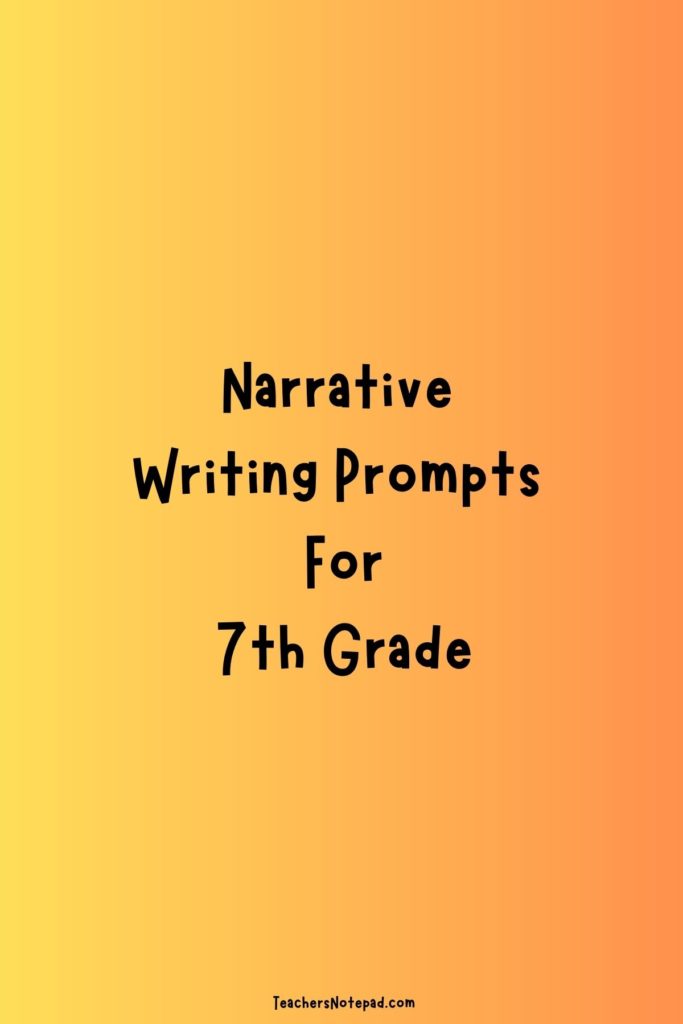
Tech, Media & Entertainment
Writing Topics & Prompts for 7th Grade
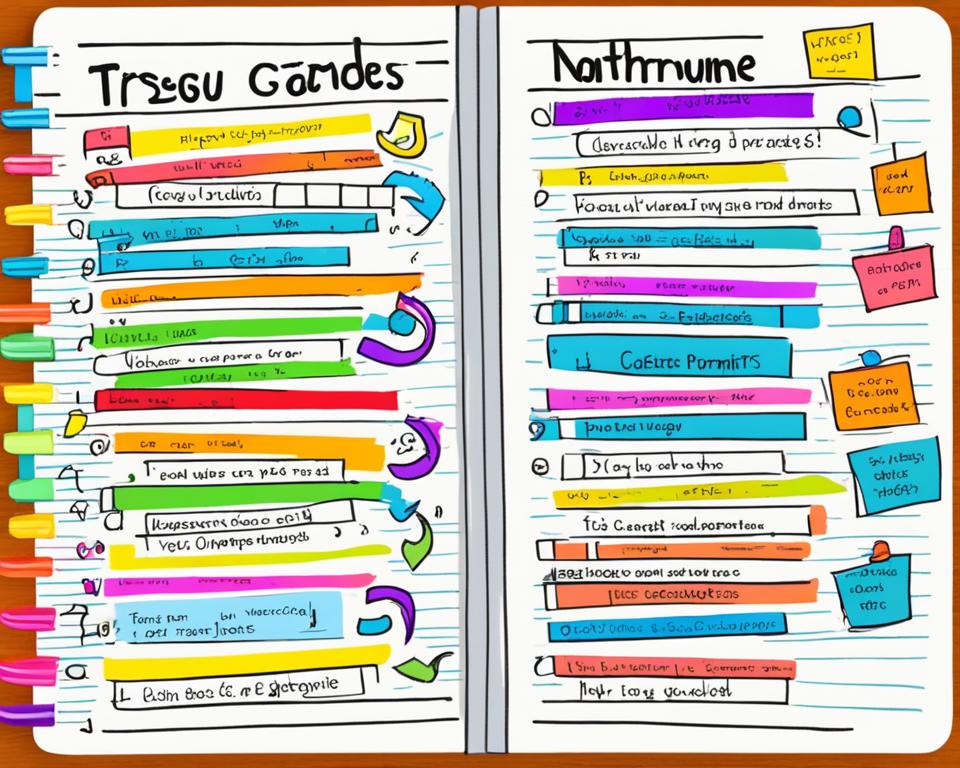
Seventh grade can be a challenging time for students as they navigate new expectations and responsibilities. One way to help them express themselves and explore their thoughts and emotions is through writing. Providing 7th graders with engaging topics and prompts can not only enhance their writing skills but also serve as a therapeutic outlet in the midst of their busy lives.
Key Takeaways:
- Creative writing ideas and middle school writing assignments are beneficial for 7th-grade students.
- Writing prompts offer a safe space for emotional expression and self-reflection.
- Exploring various writing genres can foster creativity and critical thinking.
- Providing additional writing prompts and resources can further enhance students’ writing skills.
- Journaling can help 7th graders develop important life skills and gain a better understanding of themselves.
Table of Contents
The Power of Words for 7th Grade Writers
Writing is a powerful tool that can empower and inspire 7th grade students. Through the art of writing, these young minds can explore and express themselves in ways they may not have thought possible. Journaling provides them with the freedom to unleash their thoughts without interruptions or judgment. It is a beautiful journey where every word becomes a gateway to self-discovery.
Engaging writing topics and prompts play a crucial role in nurturing the creative minds of 7th graders. By presenting them with thought-provoking prompts, we can encourage them to delve deeper into their thoughts and emotions, helping them understand themselves better.
“Words have the power to shape our reality and define who we are. By embracing the art of writing, 7th grade students can unlock a world of endless possibilities and discover the true power of their voice.” – Jane Smith, Writing Coach
Writing prompts provide a roadmap for their creative journey, allowing them to explore different genres and styles of writing. From descriptive narratives to persuasive essays, these prompts offer a diverse range of topics that cater to each student’s unique interests and perspectives.
Journaling: A Pathway to Self-Reflection and Growth
A blank page is an invitation to unleash one’s thoughts and emotions. Journaling provides a safe space for 7th grade students to reflect on their experiences, express their deepest fears and aspirations, and gain a better understanding of themselves.
Through journaling, students can embark on a journey of self-discovery where they explore their values, beliefs, and learn from their triumphs and challenges. It helps them trace their growth and evolution as individuals, fostering self-awareness and emotional intelligence.
Unlocking Creativity with Writing Prompts
Writing prompts spark the creative flame within 7th grade writers. They serve as catalysts, igniting their imagination and guiding them towards creating engaging narratives, compelling arguments, and vivid characters.
Whether it’s crafting a fictional story about a time-traveling adventure or penning a persuasive essay on an important social issue, writing prompts provide the structure and inspiration for students to develop their unique writing styles.
Embracing the Power of Words
As 7th grade students embrace the power of words, they not only enhance their writing skills but also develop essential communication and critical thinking abilities. Writing encourages them to articulate their thoughts effectively, analyze different perspectives, and present logical arguments.
Furthermore, by writing about their own experiences and fictional worlds, these young writers develop empathy and understanding for others. Their words become a bridge that connects different perspectives and promotes empathy, fostering a sense of unity within their classroom and community.
30 Writing Prompts for 7th Grade
Imagination is a powerful tool that can unlock endless possibilities in writing. Here are some fun writing exercises , narrative writing ideas , and persuasive writing prompts to spark creativity and inspire 7th graders on their writing journey:
- Write about a person you admire and explain why they inspire you.
- Describe your greatest belief and the reasons behind it.
- Recount a time when you got caught doing something wrong and reflect on the lessons learned.
- Create a story based on a conversation you would have with a grandparent.
- Imagine you are a character in your favorite book. Rewrite a key scene from your perspective.
- Write a persuasive essay arguing for or against school uniforms.
- Describe a moment when you felt truly courageous and how it impacted your life.
- Use your imagination to write a story set in a magical land.
- Reflect on a time when you felt like an outsider and how it shaped your understanding of empathy.
- Write a letter to your future self, describing your goals and aspirations.
- Imagine you found a time machine. Write a story about the adventures you would have.
- Describe an object that holds sentimental value to you and explain its significance.
- Write a narrative poem about a memorable experience in nature.
- Compose a persuasive speech advocating for the protection of endangered species.
- Imagine you could talk to any historical figure. Write a dialogue between yourself and that person.
- Describe a fictional world where everyone’s dreams become a reality.
- Write a letter to your favorite author, expressing how their work has impacted your life.
- Reflect on a time when you faced a difficult decision and explain the thought process behind your choice.
- Compose a short story with a surprising plot twist.
- Write a persuasive essay arguing for the importance of volunteering in the community.
- Imagine you could have a superpower for a day. Describe how you would use it.
- Recount a childhood memory that holds a special place in your heart.
- Write a letter to your future self, offering advice and encouragement.
- Create a fictional character and describe their personality, appearance, and background.
- Compose a short fantasy story featuring talking animals.
- Reflect on a time when you experienced failure and explain how it helped you grow.
- Write a persuasive essay arguing for the benefits of extracurricular activities.
- Imagine you could travel to any country. Write a journal entry describing your adventures.
- Describe an invention you would create to solve a pressing problem in the world.
- Compose a poem that captures the essence of a favorite place or vacation destination.
These writing prompts cover different genres and encourage 7th graders to unleash their creativity and develop their narrative and persuasive writing skills. Remember, the key to effective writing is to let your imagination soar and have fun along the way.
Bonus List of 30 MORE Prompts and Essay Writing Ideas
In addition to the previous prompts, here are more writing ideas for 7th graders. These additional writing prompts and essay topics offer students even more opportunities to express their thoughts and creativity. Whether they enjoy storytelling, persuasive writing, or reflective essays, there is something for every student to explore.
1. Perspective of an Animal
Imagine you are an animal living in a zoo. Write a narrative from the perspective of that animal, describing your daily life, thoughts, and feelings.
2. The Power of Peer Pressure
Explore the positive and negative effects of peer pressure. Share a personal experience or create a fictional story that highlights the influence of peers and the choices young people face.
3. Changes Brought by Smartphones and the Internet
Reflect on the impact of smartphones and the internet in society. Consider how these advancements have changed communication, relationships, information access, and personal experiences.
4. Creative Writing Based on a Photograph
Select a captivating photograph and use it as inspiration for a short story or poem. Describe the scene, characters, and emotions evoked by the image.
5. The Value of Volunteering
Write an essay discussing the importance of volunteering. Share personal experiences or research examples of how volunteering can make a positive impact on individuals and communities.
6. Historical Figure Who Inspires You
Choose a historical figure who inspires you and explain why they have had a significant impact on your life and values.
“The power of words can change lives and inspire greatness.” – Unknown
These additional writing prompts and essay topics offer 7th graders a diverse range of ideas to explore. Encourage your students to think critically, express their thoughts eloquently, and embrace their creativity. By providing them with a variety of writing opportunities, you can help them develop essential writing skills and foster their love for self-expression.
More Writing Prompts and Resources for 7th Grade
If the previous lists of prompts were not enough, we have got you covered with even more writing prompts and resources for 7th graders. Expand their writing horizons with a PDF worksheet containing 20 thought-provoking prompts. These prompts are designed to inspire creativity and encourage students to reflect on their beliefs and perspectives.
With a wide range of topics, from life goals to the meaning of success, these prompts will challenge 7th graders to think deeply and express themselves effectively. Whether they are exploring their dreams for the future or contemplating the values that matter most to them, these prompts will spark their imagination and help them develop their writing skills.
By engaging with these additional writing prompts, students will gain confidence in their ability to communicate their thoughts and emotions through writing. This resource offers a valuable opportunity for 7th graders to further enhance their creative writing abilities and cultivate a love for self-expression on paper.
“Writing allows students to dive deep into their thoughts and discover new perspectives.”
These writing prompts and resources provide valuable opportunities for 7th graders to explore their creativity, enhance their writing skills, and gain a deeper understanding of themselves and the world around them.
The Importance of Journaling for 7th Grade Students
Journaling can have a profound impact on the lives of 7th grade students. It provides them with a platform to slow down and process their thoughts and emotions. Through reflective writing , students can gain a deeper understanding of themselves and develop essential life skills.
The benefits of journaling are far-reaching. Not only does it serve as a creative outlet, but it also encourages emotional expression . By putting their thoughts and feelings onto paper, students can explore their experiences and beliefs in a safe and non-judgmental space. This process can lead to increased self-awareness and better decision-making.
“Journaling allows students to confront their emotions and make sense of them. It helps them develop a sense of empathy and understanding, both towards themselves and others.” – Dr. Emily Johnson, Child Psychologist
Reflective writing through journaling can also enhance critical thinking skills. As students reflect on their experiences, they are encouraged to analyze and evaluate their thoughts, actions, and beliefs. This practice fosters introspection and promotes a growth mindset, where students learn from their experiences and strive for personal development.
Furthermore, journaling can be a powerful tool for self-discovery and self-expression. It allows students to explore their creativity and experiment with different writing styles and genres. Whether they choose to write narratives, poems, or personal reflections, journaling provides a space for students to develop their unique voice and strengthen their writing skills.
Encouraging Emotional Expression through Journaling
Emotional expression is an essential aspect of journaling. By giving students the opportunity to express their emotions through writing, it not only validates their feelings but also facilitates emotional regulation. Journaling can serve as a cathartic release, allowing students to process challenging emotions and find comfort and clarity.
The act of journaling provides a sense of closure and can be particularly helpful during times of stress or uncertainty. By writing down their worries, anxieties, or frustrations, students can gain a sense of control and perspective. This practice can promote resilience and emotional well-being.
Moreover, journaling can serve as a form of self-care. By dedicating time to reflect on their day, students can prioritize their mental and emotional health. It can help alleviate stress, enhance self-esteem, and improve overall mental well-being.
To reap the benefits of journaling, it is important for 7th grade students to establish a regular journaling routine. Encouraging them to set aside dedicated time each day or week for reflective writing can help make it a consistent habit. Providing guided prompts or topics can also inspire their journaling journey, sparking creativity and promoting self-reflection.
In conclusion, journaling offers numerous benefits for 7th grade students. It provides them with a valuable tool for self-expression, emotional regulation, and personal growth. By incorporating journaling into their daily lives, students can enhance their writing skills, develop self-awareness, and navigate the challenges and triumphs of adolescence with confidence.
Encouraging Writing in 7th Grade
Encouraging 7th graders to write is crucial for their overall development and growth. Writing not only improves their communication skills but also fosters creativity and enhances critical thinking abilities. By creating a supportive and engaging environment, teachers can inspire and motivate students to develop their writing skills. Here are some effective strategies to encourage writing in 7th grade:
Provide Feedback
Feedback plays a vital role in improving writing skills. Take the time to read and provide constructive feedback on students’ work. Highlight their strengths and offer suggestions for improvement. Encourage peer feedback and facilitate discussions to foster a collaborative learning environment.
Offer Writing Prompts
Writing prompts can spark students’ imagination and inspire them to explore various topics. Provide a diverse range of writing prompts, such as personal narratives, persuasive essays, or creative stories. Allow students to choose prompts that resonate with their interests to promote intrinsic motivation.
“Writing prompts can be a springboard for students’ creativity and independent thinking.” – Jane Smith, English Teacher (function () { var randomiser = (Math.random() + 1).toString(36).substring(7); var adID = document.querySelector('#tme_net_670x280_in_article_responsive_r').id = "stpd-" + randomiser; inView('#' + adID).once('enter', (function() { googletag.cmd.push(function() { if(window.innerWidth >= 1000) { googletag.defineSlot('/22729463636/tme.net_670x280_in_article_desktop_r', [[300,250],[336,280],[640,200],[640,100],[320,250]], adID).addService(googletag.pubads()); } else { googletag.defineSlot('/22729463636/tme.net_336x336_in_article_mobile_r', [[300,250],[336,336],[336,320],[320,320],[300,300],[336,280],[320,250],[320,336]], adID).addService(googletag.pubads()); } googletag.display(adID); stpd.initializeAdUnit(adID); }); })); })();
Showcase the Value of Writing
Demonstrate to students the real-world applications of writing. Invite guest speakers, such as journalists, authors, or professionals, to share their experiences and the importance of effective writing in their respective fields. Organize writing contests or publishing opportunities to establish a sense of purpose and accomplishment.
Celebrate Writing Achievements
Recognize and celebrate students’ writing achievements to boost their confidence and motivation. Display exceptional pieces of writing in the classroom or create a wall of fame to showcase their work. Consider publishing a class anthology or organizing a reading session to share their writing with peers and parents.
Promote Writing as a Daily Habit
Encourage students to make writing a part of their daily routine. Dedicate regular time for journaling or free writing exercises. Provide resources such as writing prompts or engaging topics for students to explore on their own. Encourage them to maintain a writing journal to reflect on their experiences and personal growth.
By implementing these strategies, educators can create a nurturing environment that fosters a love for writing and supports the development of essential writing skills in 7th graders.
Writing topics and prompts play a crucial role in the development of 7th-grade students’ writing skills. They not only provide an avenue for self-expression but also encourage students to explore their thoughts and emotions in a creative and structured manner. Through engaging writing ideas and middle school writing assignments , teachers can empower students to become effective communicators and confident writers.
By encouraging and supporting their writing endeavors, teachers can help 7th graders unlock their potential and discover the joy of writing. Creative writing ideas allow students to think outside the box and develop their unique writing style. Furthermore, middle school writing assignments provide an opportunity for students to practice different writing techniques and genres, fostering their growth as writers.
Writing topics and prompts serve multiple purposes for 7th-grade students. They not only improve their writing skills but also enhance critical thinking, empathy, and self-awareness. By reflecting upon their experiences and beliefs, students gain a deeper understanding of themselves and the world around them. Additionally, writing assignments encourage students to develop organization, coherence, and clarity in their writing, essential skills for effective communication in the future.
In conclusion, providing writing topics and prompts for 7th-grade students is an invaluable tool for their academic and personal growth. It instills a love for writing, nurtures creativity, and empowers students to express themselves confidently. By incorporating creative writing ideas and middle school writing assignments into the curriculum, teachers can cultivate a generation of skilled writers who are equipped with the tools to thrive in their future endeavors.
What are some writing prompts and topics for 7th graders?
Some writing prompts and topics for 7th graders include writing about a person they admire, their greatest belief, a time they got caught doing something wrong, and a conversation with a grandparent. There are also prompts to write from the perspective of an animal in a zoo, explore the effects of peer pressure, and reflect on the changes brought about by smartphones and the internet. A PDF worksheet with 20 more writing prompts is also available.
How can writing help 7th graders?
Writing can help 7th graders explore and express themselves. It allows them to delve into their thoughts without interruptions or judgment. Writing prompts can help them understand themselves better and document their journey.
What are the benefits of journaling for 7th grade students?
Journaling can be a powerful tool for 7th grade students. It helps them slow down and sort out their thoughts and emotions. By reflecting on their experiences and beliefs, students can gain a better understanding of themselves and develop important life skills.
How can teachers encourage 7th graders to write?
Teachers can encourage 7th graders to write by providing feedback, offering writing prompts, and showcasing the value of writing. Creating a supportive and engaging environment can help students build their communication skills, foster creativity, and enhance critical thinking abilities.
Why are writing topics and prompts important for 7th grade students?
Writing topics and prompts are essential for 7th grade students to explore their thoughts and emotions. They provide an outlet for self-expression and help develop important writing skills. By encouraging and supporting their writing endeavors, teachers can empower 7th graders to become effective communicators and confident writers.
Related Posts

Swinging into the Roaring Twenties: Exploring Jazz, Flappers, and Slot Machine Mysteries

The Best AI Technologies for Market Analysis
Inspiration & Information for Self-Improvement
Writing Prompts & Topics for 7th Grade

As 7th graders navigate the transition to adolescence, it’s crucial for educators to provide them with tools to express themselves and stay engaged in their learning. One effective method is through the use of writing prompts . By offering prompts and topics that are relevant and thought-provoking, teachers can unlock the potential for creativity in their students, while also improving their writing skills.
Writing prompts provide 7th graders with a dedicated space to explore their thoughts, emotions, and personal experiences. It allows them to express themselves freely, without fear of judgment or criticism. Moreover, writing prompts help students strengthen their ability to communicate their ideas effectively, while also encouraging self-reflection and critical thinking.
With a collection of 60 writing prompts and essay topics tailored for 7th grade students, teachers have a valuable resource to inspire and challenge their students. These prompts cover a range of subjects, from personal growth and relationships to ethical dilemmas and aspirations. By exploring these prompts, 7th graders can enhance their writing abilities and develop their unique voice.
Key Takeaways:
- Writing prompts are a powerful tool to nurture self-expression and engage 7th grade students in their writing journey.
- By offering thought-provoking prompts and topics , teachers can enhance students’ critical thinking and communication skills.
- Writing prompts provide a safe and judgment-free space for 7th graders to explore their thoughts, emotions, and personal experiences.
- Utilizing a diverse range of prompts and essay ideas, teachers can inspire creativity and help students find their unique voice.
- Encouraging self-reflection through prompts strengthens students’ understanding of themselves and their actions.
Table of Contents
The Power of Writing for 7th Graders
Writing is a formidable tool for 7th graders to unleash their creativity, develop critical thinking skills, and express themselves. Through writing, students can embark on a journey of self-discovery, exploring their thoughts, emotions, and experiences without any interruptions or judgment.
Journaling, in particular, provides a safe and private space for 7th graders to reflect on their daily lives and gain a deeper understanding of themselves. It allows them to delve into their innermost thoughts, helping them make sense of their actions, decisions, and relationships.
“Writing is a window to the soul. It helps me understand who I am and what I believe.” – Ava, 7th grade student
By engaging in regular writing exercises, students not only improve their writing skills but also enhance their ability to communicate effectively. Writing prompts provide a structured framework for students to engage with a variety of topics, encouraging them to think critically and creatively. This process not only hones their writing abilities but also fosters self-expression and self-awareness.
Benefits of Writing for 7th Graders
There are numerous benefits of writing for 7th graders:
- Enhanced Self-Expression: Writing allows students to express their thoughts, feelings, and opinions freely, helping them find their unique voice and identity.
- Improved Communication Skills: Through writing, students learn to articulate their ideas clearly and effectively, fostering strong communication skills that extend beyond the written word.
- Critical Thinking Development: Writing prompts encourage students to think critically, analyze situations, consider multiple perspectives, and develop logical arguments.
- Empathy and Emotional Intelligence: Expressing themselves through writing enables students to empathize with others and explore different emotional experiences, ultimately fostering emotional intelligence.
- Positive Self-Reflection: Journaling prompts thoughtful self-reflection, helping students gain a deeper understanding of themselves, their actions, and their personal growth.
Overall, writing provides 7th graders with a platform for self-discovery, personal growth, and creative expression. Whether it’s through journaling or engaging with writing prompts, students can harness the power of words to shape their thoughts and make their voices heard.
30 Writing Prompts for 7th Grade
Looking for creative writing ideas to ignite your 7th grade students’ imaginations? Here is a curated list of 30 writing prompts designed specifically for 7th graders. These prompts cover a range of engaging topics, allowing students to explore their personal experiences, ponder ethical dilemmas, examine relationships, and aspire to their dreams.
- If you could travel back in time, which historical event would you visit and why?
- Write a story about a memorable adventure with your best friend.
“Life itself is the most wonderful fairy tale.” – Hans Christian Andersen
- Imagine you found a magical object. Describe its powers and the adventures it leads you on.
“The story I am about to tell you is one of the greatest ever written.” – C.S. Lewis
- Write a letter to your future self, outlining your goals and aspirations for the next five years.
- Describe a time when you had to make a difficult decision. How did you reach your conclusion?
- Write a poem about your favorite place in nature.
Exploring Ethical Dilemmas
- Would you break the rules to help a friend in need? Why or why not?
- If you could have any superpower, how would you use it to make the world a better place?
- Imagine you witnessed a friend cheating on a test. What would you do?
Unleashing Creativity
- Write a short story about an ordinary object that comes to life.
- Design your ideal world. How would it look, feel, and function?
- If you could invent a new holiday, what would it be and how would people celebrate?
Encourage your students to choose a prompt that resonates with them or challenges their creative thinking. These writing prompts foster self-reflection and critical analysis, helping students develop their writing abilities and express their unique voices. Remember, the power of writing lies in its ability to inspire, evoke emotions, and captivate readers. So, let these prompts be a springboard for your students’ literary adventures.
Additional Prompts and Essay Writing Ideas
If the previous list of prompts wasn’t enough, here are 30 more ideas to inspire 7th grade writers. These prompts cover a wide range of topics, including personal growth, social issues, and imaginative storytelling. Students can choose a prompt that sparks their interest or challenges their creativity . These additional prompts provide ample opportunities for students to practice their essay writing skills and further explore their ability to communicate their thoughts and ideas effectively .
These additional prompts give 7th grade students the opportunity to explore various topics and develop their writing skills further. Whether it’s delving into personal experiences, examining social issues, or letting their imagination run wild, these prompts offer a starting point for students to express their unique perspectives and enhance their essay writing abilities.
Writing prompts are a valuable tool for 7th grade teachers to encourage self-expression and improve writing skills. By providing prompts that cover a wide range of topics , teachers can engage students in meaningful writing activities that foster creativity and critical thinking.
The prompts discussed in this article offer a starting point for teachers to inspire and challenge their 7th grade students. With prompts that encompass personal experiences, relationships, ethical dilemmas, and aspirations, students can explore their own perspectives and enhance their communication skills.
Through writing, students have the opportunity to delve into their own experiences, reflect on their thoughts and emotions, and ultimately enhance their self-awareness. Writing prompts provide a structured way for students to develop their writing abilities, encouraging self-reflection and critical thinking.
By incorporating writing prompts into their curriculum, 7th grade teachers can empower their students to express themselves, explore their own unique voice, and develop essential communication skills. Writing prompts open the door to a world of possibilities and allow students to unlock their full potential as writers.
How can writing prompts benefit 7th grade students?
Writing prompts provide a structured way for students to engage with various topics and develop their writing skills. They encourage self-reflection, critical thinking, and help students express their unique voice.
What topics are covered in the writing prompts for 7th grade?
The writing prompts cover a range of topics including personal experiences, relationships, ethical dilemmas, aspirations, personal growth, social issues, and imaginative storytelling.
How many writing prompts are available for 7th grade students?
There are a total of 60 writing prompts and essay ideas available for 7th grade students.
How can journaling help 7th graders?
Journaling allows 7th graders to explore their thoughts without interruptions or judgment. It helps them understand their emotions, reflect on their experiences, and gain a better understanding of themselves and their actions.
What is the purpose of providing additional prompts for 7th grade writers?
The additional prompts aim to inspire 7th grade writers further. They offer ample opportunities for students to practice their essay writing skills, explore their creativity, and effectively communicate their thoughts and ideas.
Related Posts

TagVault Publishing

Understanding RTP and Making Informed Decisions in Online Slots
- Grades 6-12
- School Leaders
Enter Today's Teacher Appreciation Giveaway!
50 Ideas, Tricks, and Tips for Teaching 7th Grade
Brilliant ideas from brilliant teachers (like you).
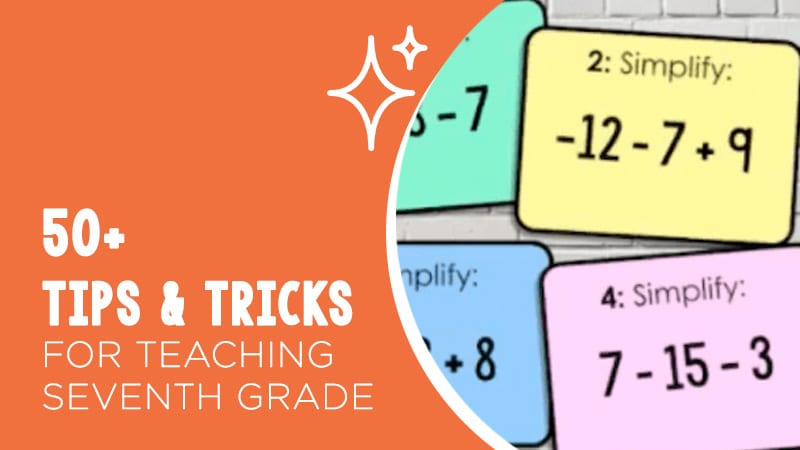
Let’s be honest; seventh grade is a unique year in a child’s (and a teacher’s) life. It takes a special kind of patience to teach middle school—and particularly seventh grade. Look no further than these 50 tricks, ideas, and tips for teaching 7th grade from our community of teachers on the WeAreTeachers Helpline and around the web. And, we’ve organized the list by topic to make it easy to find the tips most relevant to you!
The First Days of School
1. stock up on math supplies.
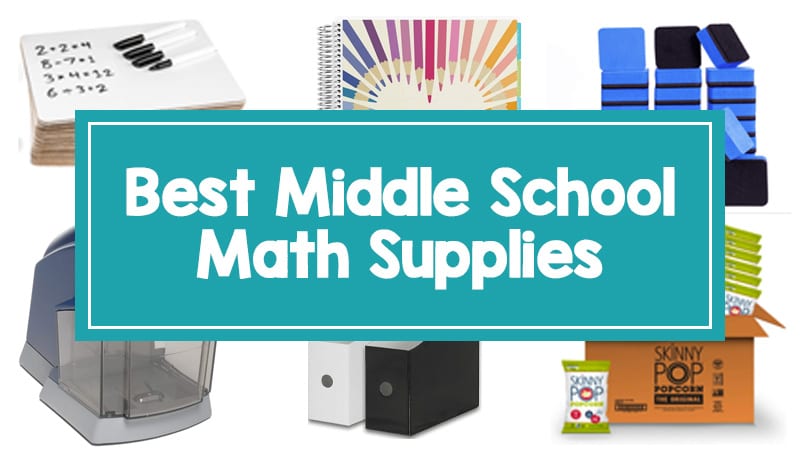
We’ve gathered all the math supplies you need for the 7th grade classroom.
2. And ELA supplies too!
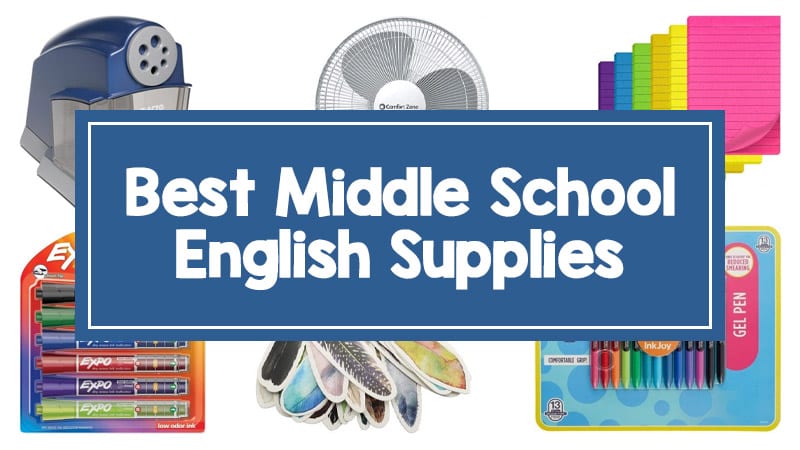
We’ve got you covered with this list of small but critical middle school English supplies for the classroom.
3. Introduce yourself creatively

There’s nothing quite like the very first moment of the first day of school. You stand at the front of the classroom, looking at all those expectant faces for the very first time. Now’s your chance to introduce yourself to your students, to let them know who you are and what they can expect over the year to come. We love these creative ways to introduce yourself .
4. Connect the middle school years
Seventh graders don’t understand how each year builds on the one before, so you’ll have to make it explicit for them. Use the upcoming year’s syllabi to set goals for summer work. For example, reading four short stories that take place during the Civil War to prepare them for studying the Civil War in eighth grade or, read five science articles to prepare them to work with current events in science class.
5. Start the year with ice breakers and review
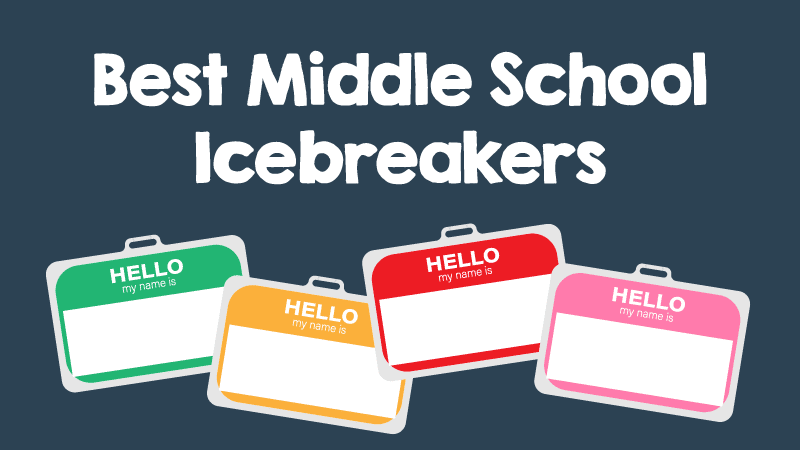
“Do a day of getting-to-know-you and then check for prior understanding of content. I teach social studies, so some maps and a quick review of topics they should have been exposed to.” —Beth T.
“I teach seventh grade English and actually had BINGO posted the first day but changed a few to specifics about our city/school. In addition to BINGO, I made a classroom scavenger hunt students completed in groups…Making time for procedures in between is, of course, critical for the year as well.” —Erin B.
Check out these ice breakers that really work!
Tips for Classroom Management
6. don’t assume that yes means yes.
“Asking ‘do you understand?’ is the wrong question when you’re teaching 7th grade. They will always ‘yes’ you to death. Instead, after you have explained what to do, ask five people to tell you what they’re supposed to do. After that’s over, if someone still asks a question, get one of the students to answer the question to the whole class.” —Kym M.
7. Ask questions
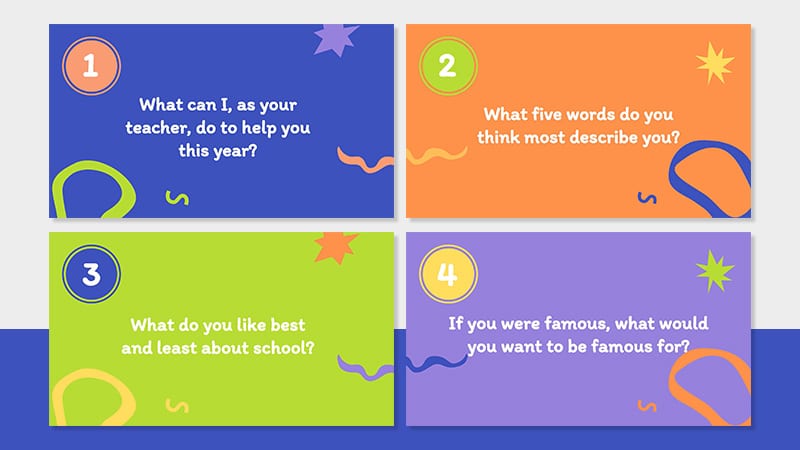
Sixth graders (and most middle schoolers, for that matter) aren’t known for offering up their opinions or thoughts as readily as younger students. Come prepared with questions that are easy and fun for kids to answer. Check out our favorite introduction questions to check in.
8. Don’t assume that they remember (or heard) the directions
“After I give directions, I ask, ‘what are your questions?’ Then, wait time…make them uncomfortable for a minute or two, until someone asks a question…then the questions will flow and you’ll get to see what you need to clarify.” —William W.
9. Teach a growth mindset
Put simply—some people believe that intelligence is fixed, while others think that it’s malleable depending on effort. Identify your students who have a fixed mindset, those who see having to try as a threat to their intelligence, and build a culture that fosters a growth mindset. Check out this interactive quiz and TED Talks to learn more about “fixed” and “growth” mindsets.
10. Get to know your students’ brains
Middle school brains are changing every day. After infancy, this is the time when kids’ brains are growing and reshaping the most. Know what’s happening in your students’ minds by reading books like Age of Opportunity by Laurence Steinberg. As one teacher says, “So many times, I have found myself thinking, “Why did he do that? Why would she take that risk? Didn’t he consider what would happen based on that choice?” Well, now you’ll know.
11. Be specific when giving directions … like very specific!
“The biggest shock for me about teaching 7 th grade was how detailed and specific I needed to be in giving direction. Assume they don’t know anything.” —Tiffany P.
12. Break out all your organization skills
“Be ORGANIZED. Have a procedure for everything.” —Pam W.
13. Create a foolproof lesson plan
“You need a foolproof lesson plan (one that you’ll love to teach and they’ll love to participate in) to pull out of the air during high-stress times.” —Lisa A.
Here are five we love for the days when you’re seriously exhausted.
14. Try flipping your class
Try teaching a flipped class with Flipgrid . You and your students can record videos that kids can watch at home or in a small group/center. You can use the classroom time for working with students.
15. Develop your own style
“The classroom management system that ends up working for you is likely very different from the management system that works for every other teacher in your building. I made the mistake my first two years of trying to emulate a teacher who screams all the time…what ended up working for me was a more positive tone and having a concrete system of behavior grades that students could see and check. Experiment and try everything until you hone in on what works for you.” — Lillie M. quoted in Education Week
16. Talk Positive
“Aim to make more than half of what you say positive and enjoyable to listen to. If everything you say is consistently harsh, punitive, or nasty, humans of all ages are far less likely to listen.” — Lillie M. quoted in Education Week
17. Laugh (and laugh some more)
“My best advice after teaching 7 th grade for 13 years is to have some fun with the kids and laugh every single day!” —Tammy S.
Tips for Language Arts
18. give students choice in literature circles.

Seventh graders love literature circles, and they encourage strong discussion and ownership over reading. Build choice into your literature circles by providing them with a few novel choices and a blank calendar to plan out their reading. Check out our book lists here and here for middle grade books we love.
19. Introduce over 50 short stories
It can be a challenge to get middle schoolers interested in reading. The thought of tackling a thick novel can be overwhelming, especially during distance learning. Short stories are always a great choice .
20. Include poetry
It can be hard to know which poems will spur your middle and high schoolers into deep, meaningful discussion and which will leave them yawning! So we asked experienced teachers to share their favorite poems that always get a reaction, even from teens. Check out the list of poems here .
21. Deck out your classroom library with seating
“I use the camping chairs and my kids love them.” —Martha C.
“I got pillows from thrift stores, cheap pillowcases, and made my own covers. I let my students sit on the floor or lay under their desks to write and read if they feel the need.” —Linda W.
“Get camp chairs, you can get quite a collection for cheap and they take up little space when folded up.” —Deanna J.
22. Make writing explicit
Teach seventh grade students how to write clearly by assigning them to write a simple essay—how to make a peanut butter and jelly sandwich. Then, try to follow each set of directions. The results might not surprise you (the essays won’t be easy to follow), but your students will take the lesson to heart.
23. Don’t skip the daily read aloud
Seventh graders do like to be read to; in fact reading to them can inspire them to explore new genres and share a common reading experience. This read aloud list from Read Aloud America suggests titles like Boy by Roald Dahl and My Side of the Mountain by Jean Craighead George.
24. Adjust the reading level for current events
“ NEWSELA has current events articles that span a variety of topics. Students are able to adjust the Lexile to the appropriate (or close) level.” —Kimberly W.
25. Differentiate reading instruction and keep pace
“Let them choose from several books with similar themes rather than having everyone in the class read the same book at the same time. Give them assessment options (such as tic-tac-toe boards), so they can choose. Don’t spend forever on the same book (i.e., 6-week units) because most will finish the reading the first day or so and be bored when the book is still being picked apart a month later.” — Kristy W.
26. Get flexible with annotation
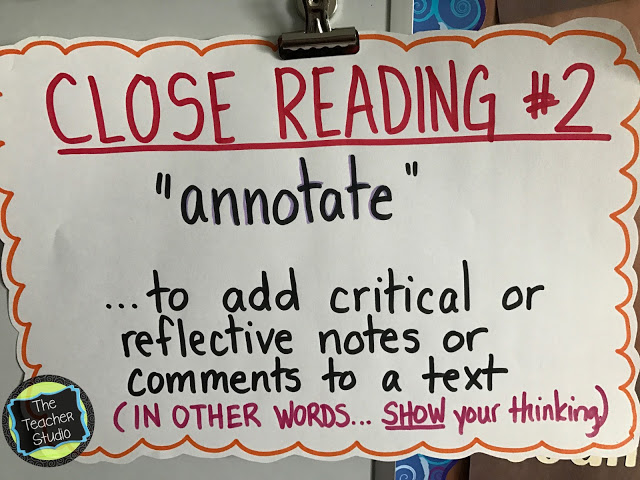
Annotation is a difficult skill, but 7 th graders need to master and internalize it. Have them use plastic covers to practice annotation in different kinds of books—the classics, textbooks, and even magazines.
27. Host a Socratic Seminar
Socratic seminar is a way for students to both engage in and reflect on deep discussion. Here’s a guide to Socratic seminars from ReadWriteThink .
Tips for Math
28. use math manipulatives.
“Get some manipulatives, like fraction circles, pattern blocks, power solids, geoboards, playing dice, spinners, etc.” —Gayle H.
29. Build a digital escape room!
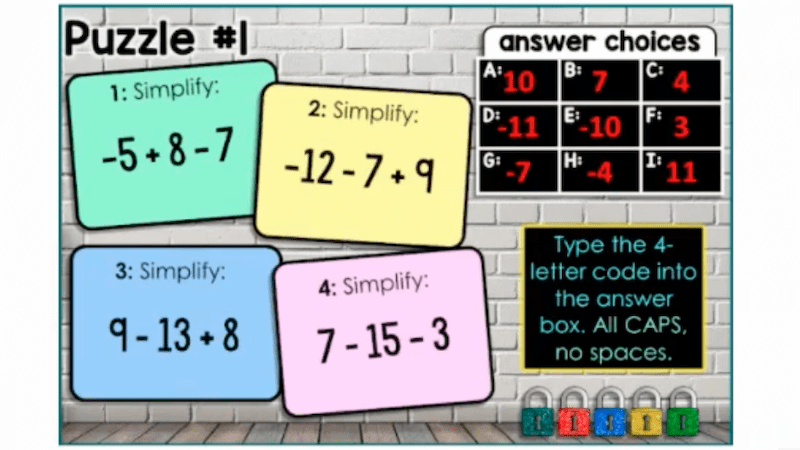
Digital escape rooms provide students with a way to challenge, review, and compete. It’s a more exciting way to do math.
30. Blow their minds
It’s easy (too easy) to catch middle schoolers off-guard and surprise them. Blogger 7th Grade English uses curveball questions like: “When the day after tomorrow is yesterday, this day will be as far from Friday as this day was from Friday when the day before yesterday was tomorrow. What day is it?” to catch his students off guard and really make them think.
31. Gamify math
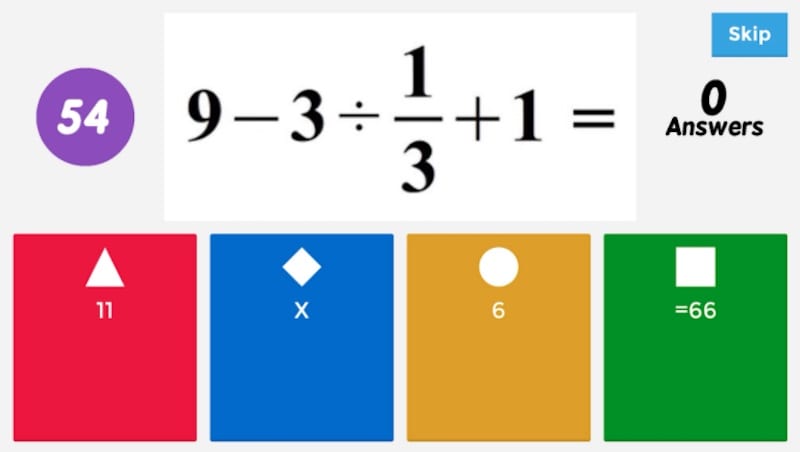
“Using Kahoot! in my middle school math class has helped to gamify content, practice vocabulary, and serves as a fun way to review.” —Erika
32. Get practical

Make math applicable for seventh grade students by bringing in lessons like scaling up candy wrappers and using Barbie to teach proportional reasoning .
Tips for Social Studies
33. teach the branches of government.
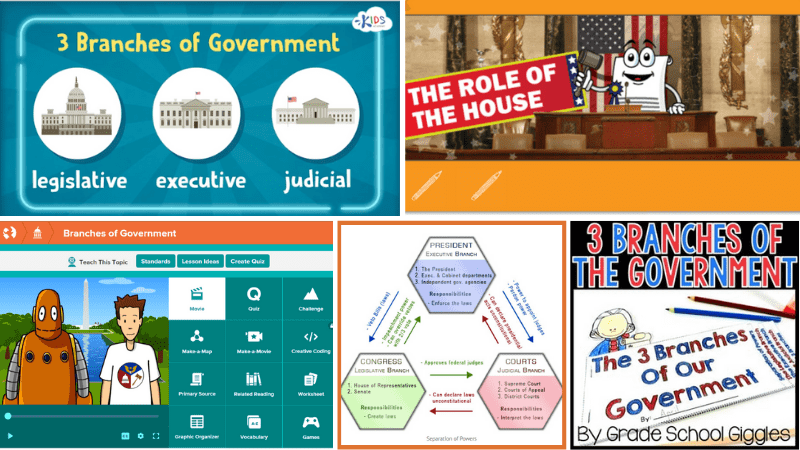
More than ever, our country is examining the laws that were put in place to protect and guide us. It can be overwhelming, however, to explain exactly how that works. To help you give your lesson plans a boost, we’ve put together this list of resources that help teach kids about the branches of government.
34. Use Instagram
Embrace the selfie culture (kind of). These tips for teaching 7th grade using Instagram (like creating a historical figure’s account) will make them learn and smile.
35. Use online learning
There are some amazing websites out there for teaching social studies lessons. Check out our 50+ favorites .
Tips for Science
36. conduct appropriate science experiments.
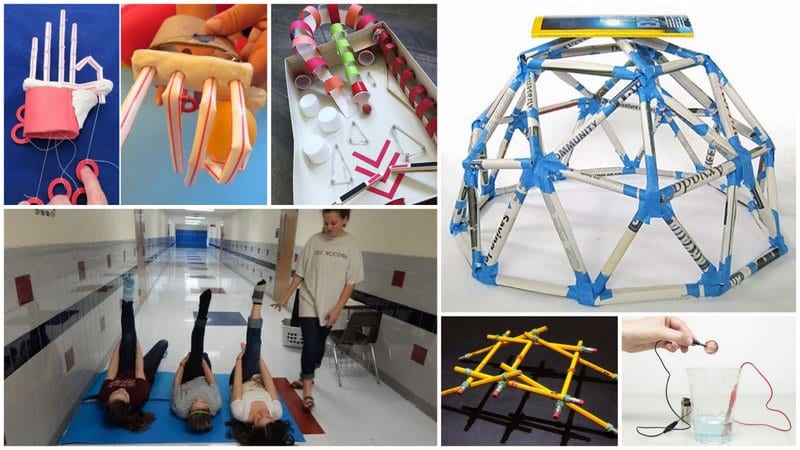
Kids of every age love hands-on science! Teachers do, too, because the learning is a lot more meaningful when students see concepts in action. This roundup of seventh grade science experiments and activities has a little something for everyone—from biology and ecology to physics and chemistry.
37. Pull up a science website
Science is exciting. Unfortunately, students can find the lessons a little dry. Whether you’re in the classroom or teaching online, finding the right resources can bring these complex concepts to life! To help you get started, here’s a list of the best science websites for middle school .
38. Use virtual field trips

Middle schoolers want to learn all they can about the world, but a field trip a week just isn’t in the cards. Try our top virtual field trips !
39. Help students develop research skills
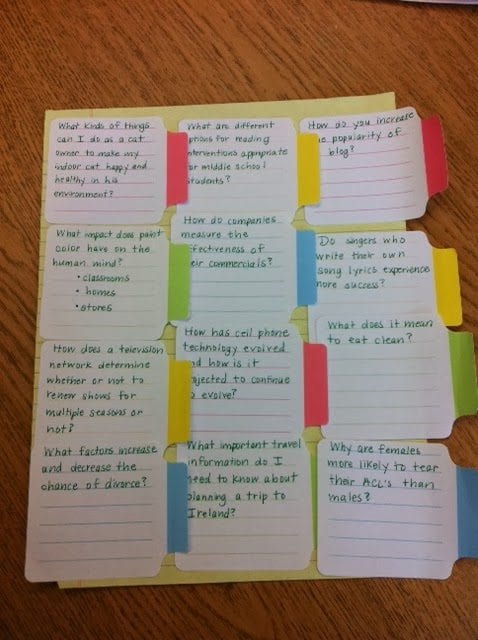
Seventh graders are developing the research skills they’ll use in high school and beyond. Help them ask authentic questions, complete useful prewriting, narrow their purpose, and share their work with these tips from the Middle School Teacher to Literacy Coach blog.
40. Turn science into a challenge
When you’re teaching science, “stress that the goal isn’t to make the lab experiment ‘work’ but to work collaboratively and problem solve together. Teach students how to ask questions and watch them figure out how to find answers.” —Laurie P.
41. Mix up your science instruction
“Do a rotation of lectures and notes with videos, labs, other labs. Do mini labs that last 15 minutes and longer labs that last class periods or multi-day project. That way, they don’t get bored and neither do you.” —Kathie N .
Tips for Projects and Grading
42. use a plagiarism checker.

Don’t fret over those essays! Use a plagiarism checker to make sure everyone’s writing is unique.
43. Schedule class time for projects
“Seventh graders need more direct instruction and in-class work time when it comes to projects.” —Tesha L.
44. Divide projects into chunks
“I found it helpful to provide students with project worksheets that divided the project into stages. Each stage has its own deadline.” —Candy J.
45. Use mini-rubrics to keep students on track
“I recommend mini-rubrics along for each section along with strong guiding questions.” —Lindi E.
46. Consider pre-research
“With some groups, I needed to do pre-research for them to narrow down the scope of information to filter. I simply found quality resources, printed and organized them into a bundle and gave them to students.” —Linda E.
47. Hold students accountable
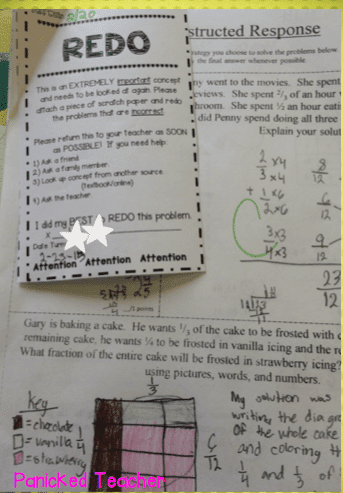
It’s inevitable that you’ll get unacceptable work from your students. Combat that by stapling redo slips to work that is a far cry from A-material. Students have to rethink their work, fix it, and return. This and more teaching 7th grade tips on Panicked Teacher .
Tips for the Arts
48. get on stage.
“Go to the MTI ( Music Theatre International ) website. You can buy what’s called a Showkit that has everything you need to do a show, and a great guide for first-time directors. I am directing the first show at my school, although I’ve directed community shows. Make sure you communicate well with parents and get them involved! It’s a great thing for kids!” —Beverly B.
49. Teach thesis
A song’s chorus is similar to a research paper’s thesis—it’s what the singer wants the listener to take away, no matter what. Connect chorus and thesis with this series of lessons, you’ll capture your musical students.
50. Get crafty.
Even seventh graders like to make crafts like duct tape hearts for Valentine’s Day, flower pens for Mother’s Day, or 3-D shape flipbooks in math. Even better if crafts overlap with other concepts!
Do you have any great tips for teaching 7th grade? Share them in the comments below!
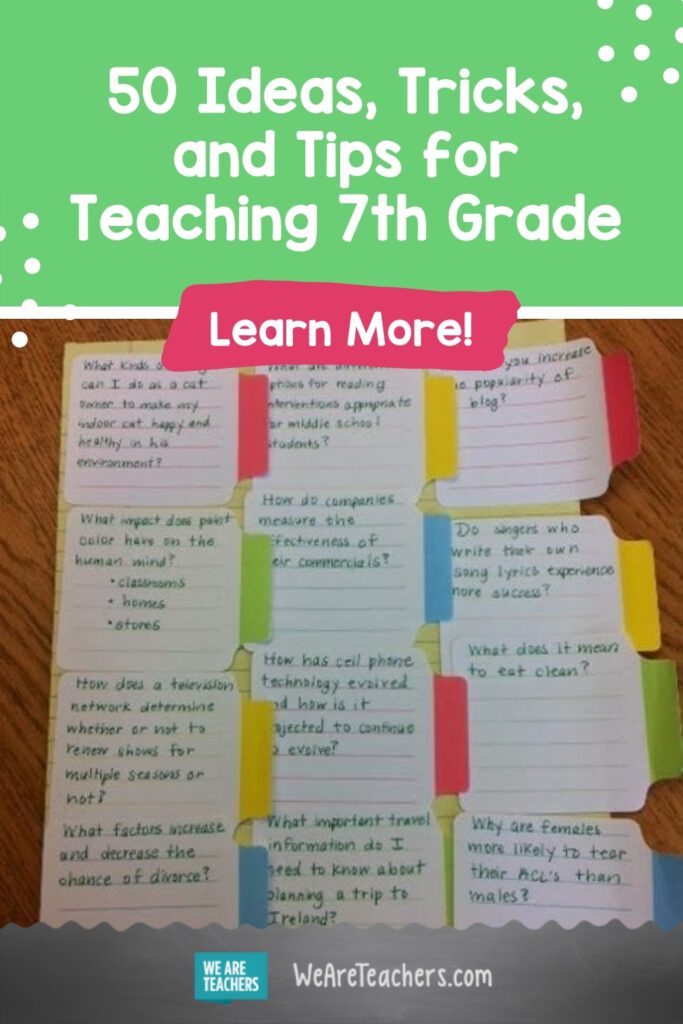
You Might Also Like
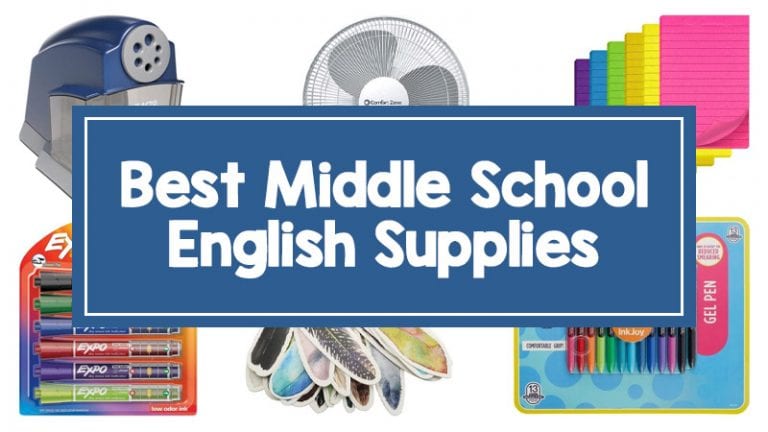
23 Items Every Middle School ELA Classroom Needs
Classroom preparation is the key to success! Continue Reading
Copyright © 2024. All rights reserved. 5335 Gate Parkway, Jacksonville, FL 32256
- Book Lists by Age
- Book Lists by Category
- Reading Resources
- Language & Speech
- Raise a Reader Blog
- Back to School
- Success Guides by Grade
- Homework Help
- Social & Emotional Learning
- Activities for Kids
The Guide to 7th Grade: Reading and Writing
Review reading and writing curricula for 7th grade, including what to expect and resources to support learning..
Seventh graders are able to focus more on growing the skills they began to develop in the 6th grade without the added stress to adjusting to the new middle school environment. By 7th grade, it is expected that students have acclimated to life as a middle school student and are therefore expected to work more independently and organize their time and schedules with less (but still some) guidance.
In general, in 7th grade, students build on the skills they learned in 6th grade by writing and reading more complex and longer texts and essays. This work will prepare them for 8th grade where they will cement and further their skills, ultimately setting them up for success in high school.
Read on for what to expect this year, and shop all seventh grade resources at The Scholastic Store .
7th Grade Reading
In 7th grade, students deepen their ability to analyze the texts they read and provide evidence from the text to do so. Specifically, 7th graders learn to examine texts more closely and use details from the text in order to develop ideas, analyze, and make inferences.
In addition, they analyze the relationships between elements within one text and across multiple texts while supporting this analysis by citing evidence from the text.
In order to build reading skills, your 7th grader:
- Analyzes texts using the text as evidence to support the analysis.
- Makes inferences about texts and uses evidence from the text to support the inferences.
- Understands the message or ideas in a text and uses evidence to support these claims.
- Understands, tracks the progress of, and summarizes the main idea of a text, using evidence from the text.
- Analyzes and explains the relationship between different elements such as character and setting.
- Analyzes the impact of specific language and word choice used in a text.
- Understands how the different structures used in a text, such as poetry or drama, affect the text.
- Compares and contrasts the different perspectives and points of views in a text.
- Determines the author’s point of view in a text using evidence from the text.
- Compares different versions such as a stage version, film, or audio version of a text, paying specific attention to the way in which elements such as lighting, scenery, or audio sounds affect the message of the text.
- Compares a historical account of an event, person, or place with a historical fiction text about the same period.
- Read a variety of texts, including stories, poetry, drama, non-fiction, or informative texts.
- Compares multiple texts written by different authors about the same topic and determines how their different perspectives are presented through their presentation of facts and the inferences they make.
7th Grade Writing
Similar to the work they do in reading, 7th graders deepen their writing skills by using analysis, paying close attention to detail and providing reasons, proofs, and examples for the ideas they express. 7th graders write a variety of genres, including informative pieces, opinion pieces, and narratives and they complete both short-term and long-term writing assignments.
There is also particular attention paid to research and teaching students to do their own independent research and research projects as described below, specifically through the use of digital resources.
In order to build writing skills, your 7th grader:
- Introductions
- Acknowledgements of opposing claims
- Logical and orderly presentations of reasons and evidence
- The use of appropriate transitions, words, and phrases to connect claims
- A concluding sentence or paragraph which supports the argument made
- A formal tone and style
- Use supporting claims and evidence that are based on credible texts and resources
- Include an introduction that has an explanation of what follows
- Develop topics through the use of facts, detailed quotations, and examples and subject specific terms and definitions
- Include transitions that connect concepts and paragraphs
- Include a conclusion that supports the presented idea(s)
- Maintain a formal “essay type” style
- Integrate other forms of media and formats, such as graphs, charts, headings, and audio or video when appropriate
- A narrator, characters, and a point of view
- Descriptive detail and sensory language to describe characters, settings, and experiences
- Dialogue details and descriptions of characters, setting, and experiences
- A clear structure with a logical order and flow, as shown through the use of transition words
- A conclusion that is connected to and builds on the narrative
- Plans, revises, and edits writing, specifically with guidance from teachers and peers, focusing specifically on trying new approaches and making sure the writing has a purpose and appeals to its audience
- Uses technology and the Internet to produce and publish writing
- Works with others and cites sources
- Works on multiple, short research projects that answer a specific question and cite multiple sources, while gathering additional questions for later research
- Uses both print and digital resources to conduct research, focusing on using appropriate search terms and reliable sources
- Uses quotes and a standard format for citation
- Uses research to analyze and make inferences
Shop the best resources for seventh grade below! You can find all books and activities at The Scholastic Store .
Explore other grade guides:
- Kindergarten
- First Grade
- Second Grade
- Third Grade
- Fourth Grade
- Fifth Grade
- Sixth Grade
- Eighth Grade
Your Seventh Grade Book Checklist
Sign up and get 10% off books.
A .gov website belongs to an official government organization in the United States.
A lock ( ) or https:// means you've safely connected to the .gov website. Share sensitive information only on official, secure websites.
- About Mild TBI and Concussion
- After a Mild TBI or Concussion
- Health Disparities in TBI
- Comparing Head Impacts
- Clinical Guidance
- Mild Traumatic Brain Injury Management Guideline
- Resources for Health Care Providers
Traumatic Brain Injury & Concussion

About Moderate and Severe TBI

Preventing TBI
Symptoms of Mild TBI and Concussion

Where to Get Help

Facts About TBI
For Medical Professionals

Clinical Guidance for Pediatric mTBI

Health Care Provider Resources
CDC Programs

HEADS UP Online Training Courses
National Concussion Surveillance System
Core State Injury Prevention Program (Core SIPP)
A traumatic brain injury, or TBI, is an injury that affects how the brain works. TBI is a major cause of death and disability in the United States.
For Everyone
Health care providers.
- Our Mission
5 Ways to Create a Literacy-Rich Preschool Classroom
Consider these straightforward ideas for setting up a literacy-friendly environment for pre-K learners.

Language and literacy skills in preschool and kindergarten are a strong predictor of children’s academic achievement in all subject areas through high school. In light of this, many preschool teachers feel compelled to provide rote, direct instruction to explicitly teach alphabet knowledge and phonics. Contrary to this inclination, theories of child development suggest that children are concrete learners and retain information best when it is grounded in their existing knowledge (e.g., constructivism ). Teachers can support this by offering real and meaningful experiences that help children connect new learning to what they already know.
The good news for preschool teachers is that such experiences don’t necessarily require hours of planning and carefully crafted lessons. Preschool classrooms can be filled with literacy-rich materials and opportunities for teachers to facilitate meaningful, contextualized learning throughout children’s day.
Here are five ways that preschool teachers can create a literacy-rich environment that encourages children’s natural curiosity and meaningfully promotes emergent reading and writing skills.
An environment for literacy
1. Label children’s personal items and spaces with their photos and names: Preschoolers first begin to identify the letters in their own names, followed by their friends’ names. Add labels with children’s photos and their names to cubbies, coat hooks, seats, place mats, classroom jobs, or any other individual items you may have in your classroom.
When it is time to put things away, encourage children to find their own name. This not only encourages valuable self-help skills but also helps them begin to identify their names in print. Occasionally, you can also ask children to help a friend put away their items too. For example, “Sally left her water bottle on the table. Can you put it in her cubby?”
When children are ready, remove the photo support and continue with only written names. Ask questions like “How do you know that’s Sally’s cubby?” to guide them toward letter identification in the context of their friends’ names.
2. Label classroom materials with both pictures and words: Environmental print in the classroom serves multiple purposes. First, photos of materials with word labels on baskets, bins, and shelves help children easily find materials and know exactly where those materials belong when they’re cleaning up. They also allow children to see that print has a purpose and that groups of printed letters represent words.
Finally, with adult support, children can begin to associate beginning letters with sounds, using the pictures of familiar classroom materials as a reference. As children are cleaning up, try asking, “What goes in this basket?” and “How do you know?” Encourage them to “read” the label using the pictures and the words.
3. Add books to every learning center or interest area: Books don’t have to be limited only to your classroom library. Adding a basket of topic-related books to each interest area helps children develop an understanding between print and its purpose.
Educator Kristin Rydholm provides some great lists of picture books related to dramatic play , blocks , math , and makerspaces . Here are some relevant topics for books for interest center libraries.
- Community helpers, different types of families, and cookbooks in the dramatic play center
- Buildings, construction, and maps or atlases in the block area
- Books showcasing famous artists or featuring colors and shapes in the art center
- Counting, numbers, sorting, and patterns in the math center
- Critters, nature, and creating with loose parts in the science center
- Mentor texts in the writing center (like A Squiggly Story , by Andrew Larsen)
4. Offer writing materials in every learning center or interest area: Preschool teachers often have a writing center available in their classroom, but why limit writing to just one space? Adults use writing all the time—from writing out birthday cards to jotting down grocery lists and sticky note reminders, writing is all around us. Young children, who learn best through meaningful and contextualized experiences, should also have opportunities to practice writing for a variety of purposes. Though a well-crafted writing center is important, offer writing materials in every area of the classroom.
The National Association for the Education of Young Children provides tips for strategically placing writing materials throughout the room and connecting emergent writing experiences to topics of interest. Other opportunities for emergent writing practice throughout the classroom may include the following:
- Taking restaurant orders, making price tags, and more in the dramatic play center
- Drafting architectural plans and labeling buildings in the block center
- Recording observations of a science experiment in the science center
5. Create resource rings with relevant vocabulary words: With intentional and continued exposure, young children can build the rich and expansive vocabulary they need for later reading development. As your class explores new topics of interest throughout the year, be intentional about exposing children to new vocabulary words.
Create resource rings with topic-related vocabulary words and picture cues to add to a designated area of the classroom; some teachers may prefer to place these in the writing center. Add a hole punch to each card, and group topic-related word cards on a single binder ring. These school-related vocabulary cards by Karen Cox are a great example. As children are discussing topics of study with their friends, or writing/drawing about their learning, direct them to the resource rings as a tool for remembering and/or writing vocabulary words.
Preschool language and literacy skills are critical for children’s long-term school success, but teachers shouldn’t feel pressured to spend hours planning for direct instruction. Much of children’s early language and literacy learning will occur organically in a literacy-rich preschool classroom. By embedding language and literacy materials throughout the classroom with special attention to each interest area, teachers can encourage literacy development in ways that are engaging, contextualized, and driven by each child’s interest.
Georgia's Supreme Court election: What to know ahead of the primary

Another Georgia election is right around the corner, and thanks to early voting, many residents have already cast their ballot. While partisan politics generally takes up the most airtime, one nonpartisan race has begun to make headlines this year: the battle over a state Supreme Court seat.
Though they are often much quieter than their partisan counterparts, judicial elections nonetheless play a crucial role in the lives of Georgia residents. Here’s what you need to know about this year’s judicial elections.
When are the next Georgia judicial elections?
Nonpartisan elections will be held as part of the Georgia state primary on Tuesday, May 21. Voters should check their My Voter Page at https://mvp.sos.ga.gov/s/ to view the most up-to-date information about their registration status, polling locations, and sample ballots.
Who is running for the Georgia Supreme Court in 2024?
Four sitting justices, John Ellington, Nels Peterson, Andrew Pinson and Chief Justice Michael P. Boggs are currently running for re-election. The newest member of the court, Andrew Pinson, is currently being challenged by former Democratic Congressman John Barrow.
Prep for the polls: See who is running for president and compare where they stand on key issues in our Voter Guide
Barrow recently made headlines by openly centering abortion rights in his Georgia Supreme Court campaign — a tactic that has made him the subject of an ethics complaint due to a state law that urges judicial candidates to “not make statements or promises that commit the candidate with respect to issues likely to come before the court that are inconsistent with the impartial performance of the adjudicative duties of judicial office.”
More: Mark your calendars: Here is every date you need to know to vote in Georgia in 2024
Barrow defended his position at the Atlanta Press Club Debates in April.
“Partiality has nothing to do with your opinions about the law,” he said. “As the root word implies, it entails feelings about the parties, being in favor of one party or another. The United States Supreme Court explained this a good while back when they said ‘impartiality,’ of the sort that judges should strive for, means you're not going to favor one party over another.”
“Every person who's expected to be a judge has to have strong feelings about the law,” Barrow continued. “If he doesn't, he's not qualified to serve on the court.”
Barrow filed a lawsuit in federal court in response to the complaint, arguing that it impedes his First Amendment right to free speech, but a judge has yet to issue a ruling.
Georgia elections: Important dates, how to register, and what to know ahead of 2024
What types of cases does the Georgia Supreme Court hear?
The Georgia Supreme Court is the highest judicial power in the state, and thus will review decisions in both civil and criminal cases made by lower courts across the state. The court has appellate jurisdiction over a wide variety of cases, including:
- Constitutionality cases
- Election contests
- Cases involving title to land, divorce, wills or equity
- Death sentence appeals
- Habeas corpus (unlawful detention) cases
- All cases involving extraordinary remedies
The nine justices will typically hear cases en banc , and assign one justice to write the court opinion. In order for a lower court decision to be overturned or reversed, at least five justices must concur.
How do Supreme Court elections work?
Unlike seats in the legislative or executive branch, justices on the supreme court are elected through a nonpartisan election process, and serve six-year terms. This year, four of the nine justices are running for re-election, with only one justice facing a primary challenger.
Although Supreme Court justices in Georgia are elected via popular vote, there is rarely an open seat on the court; new justices are almost always appointed by the governor to finish out their successor’s term, and will then run as an incumbent in the next election.
Though partisan politics don’t necessarily play a role in judicial campaigns, the overall composition of the court skews conservative. Out of the nine sitting justices, eight were appointed by Republican governors, including Pinson. The other was appointed to a state appellate court by a Democratic governor, and later won his seat unopposed.

IMAGES
VIDEO
COMMENTS
The post is now updated and includes a grand total of 60 writing prompts and essay ideas. Take a look and enjoy. Yeppers. As seventh graders get ready to transition into their turbulent teenage years, it's incredibly important for teachers to do everything they can to keep their students focused and grounded. Table of Contents.
Spark your students' interest with these 100 7th grade expository writing prompts, including compare and contrast prompts, descriptive writing ideas, and more.
Explain. Write an essay about the importance of mental health. Tell the detailed story about how you met your best friend. Write a story about a 7th grader whose determination to be the best gets them into trouble. Pick an athlete and write 5-7 paragraphs about their accomplishments. Explain why you admire them.
These prompts can help 7th-grade students to engage more deeply with topics and improve their writing skills. Happy writing! Alternate Fairy Tale Ending: After reading the classic ending of Cinderella where she marries the prince, write an alternate ending. Passage: "And they lived happily ever after.".
5. Make up a story about a seventh-grader who plays an April Fool's joke on classmates. 101 Great Middle School Writing Prompts. 6. Draft a gracious letter to the air, thanking it for all of its benefits. 7. Recall a memory of your sibling, cousin, or friend doing something hilariously funny. 8.
100 Writing Prompts for 7th Graders. Personal writing is like opening a window into your soul, allowing fresh insights to pour in and old doubts to flutter out. Every prompt is an invitation, a beckoning to delve deeper into your own psyche, experiences, and aspirations. From your bravest moments to your most profound failures, these questions ...
From persuasive writing prompts to compare and contrast, we have much to help 7 th graders refine their core writing skills. We'll discuss: Compare and contrast writing prompts. Persuasive writing prompts. Expository essay writing prompts. Creative essay writing prompts. Descriptive essay writing prompts.
Here are 20 themed prompts to cultivate a unique expressive journey: Write about your experience adjusting to the new demands of 7th grade. Describe a new friendship you've made this academic year. Think of an issue at school that you'd like to change. Write a letter to the school principal about it.
Creative Essay Writing Prompts. Creative essays are meant to be expressive, imaginative, and original. These writing prompts will get your students' creative juices flowing: 40. You own two pets from different species. Write a narrative from the perspective of your two pets about a day spent at home alone. 41.
Children will be inspired to reflect on their experiences and consider their future objectives due to the seventh-grade writing prompts. 7th grade symbolizes the start of academic education and the transition to secondary school. It presents unique difficulties for many children. This is the ideal moment to encourage pupils to begin a notebook ...
Conclusion. Writing Essays, and English grammar requires learning from expert English tutors, especially for 7 Graders who may also be preparing for NAPLAN. You can also find online math tutors on CrunchGrade - an online tutoring platform that has over 300+ tutors and 1000+ happy students like you. If you're confused about how it works, you ...
Writing Prompts for 7th Grade. By seventh grade, students should be refining the core writing skills of brainstorming, researching, outlining, drafting, and revising. In order to hone these skills, seventh-grade students need regular practice writing a variety of essay styles, including narrative, persuasive, expository, and creative essays.
Write A Story About The Classmate You Admire. Write About Your Favourite Teacher. Write About A Time You Let Someone Down. Write About Your Favourite Books. Write A Review On The Worst Books You Have Read. Write About A Friendship You Lost. Write About What You Love Most About Yourself. Write About Something You Want To Do.
By implementing narrative writing into your curriculum, you give your students an outlet to experiment with in a safe and structured environment. Below, you will find a list of narrative writing prompts to help your 7th graders let out some of their thoughts and get them writing about something that matters to them. Using This Guide
Describe a usual day in the life of a printer. 4. Describe what things you would do if you could trade places with any famous person for a day. 5. Write a recipe teaching seventh graders how to show kindness. 6. Describe a new city you founded. 7. For a day, you are a chair.
Writing topics and prompts serve multiple purposes for 7th-grade students. They not only improve their writing skills but also enhance critical thinking, empathy, and self-awareness. By reflecting upon their experiences and beliefs, students gain a deeper understanding of themselves and the world around them.
There are numerous benefits of writing for 7th graders:. Enhanced Self-Expression: Writing allows students to express their thoughts, feelings, and opinions freely, helping them find their unique voice and identity. Improved Communication Skills: Through writing, students learn to articulate their ideas clearly and effectively, fostering strong communication skills that extend beyond the ...
7th Grade Persuasive Writing Prompts. Instructor Adam Nystrom. Adam owns a Master's degree in Professional and Digital Media Writing. During his time as a graduate assistant, he developed lesson ...
22. Make writing explicit. Teach seventh grade students how to write clearly by assigning them to write a simple essay—how to make a peanut butter and jelly sandwich. Then, try to follow each set of directions. The results might not surprise you (the essays won't be easy to follow), but your students will take the lesson to heart. 23.
7th Grade Reading. In 7th grade, students deepen their ability to analyze the texts they read and provide evidence from the text to do so. Specifically, 7th graders learn to examine texts more closely and use details from the text in order to develop ideas, analyze, and make inferences. In addition, they analyze the relationships between ...
Nov. 6, 2023. Mild Traumatic Brain Injury Management Guideline. View clinical recommendations for diagnosis and management of adults with mild TBI. Apr. 29, 2024. Health Care Provider Resources. View resources to manage and prevent concussions. Apr. 15, 2024.
An environment for literacy. 1. Label children's personal items and spaces with their photos and names: Preschoolers first begin to identify the letters in their own names, followed by their friends' names. Add labels with children's photos and their names to cubbies, coat hooks, seats, place mats, classroom jobs, or any other individual ...
That's because experienced developers adhere to best practices established by the community. These practices are often overlooked in online tutorials but are crucial for large-scale applications. In this article, I will be sharing 7 tips that I use in my production code for clearer and more organized code. 1. Type Hinting and Annotations
When are the next Georgia judicial elections? Nonpartisan elections will be held as part of the Georgia state primary on Tuesday, May 21. Voters should check their My Voter Page at https://mvp.sos ...